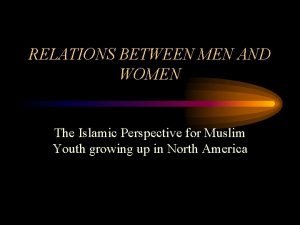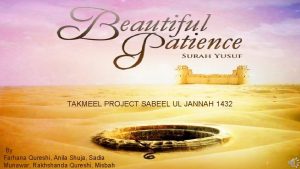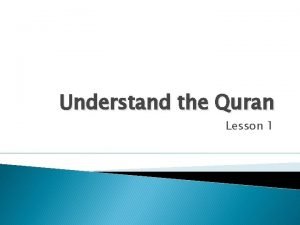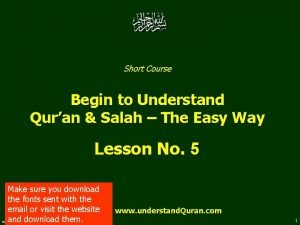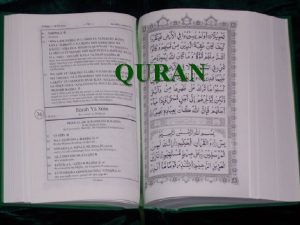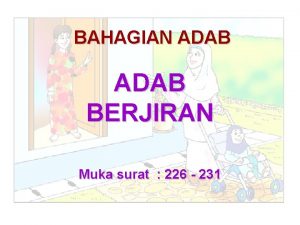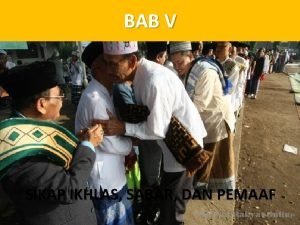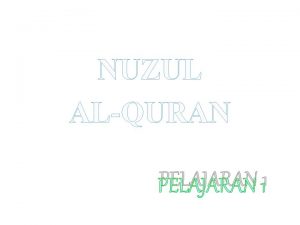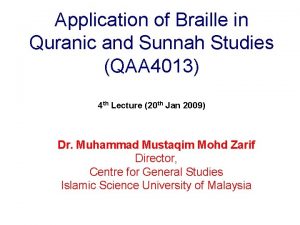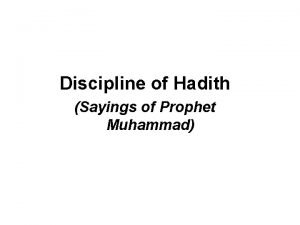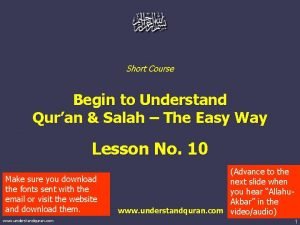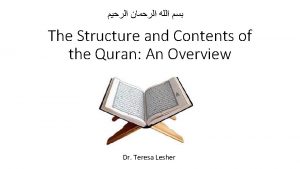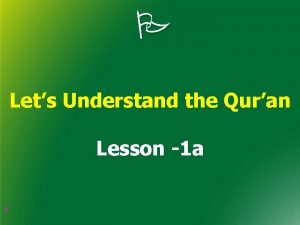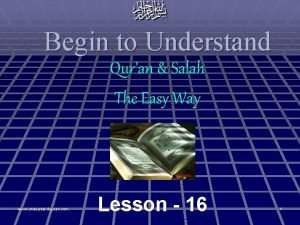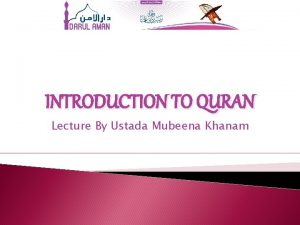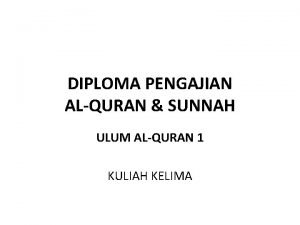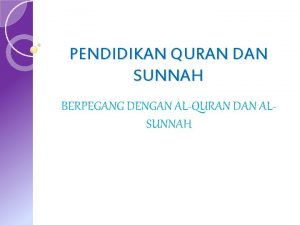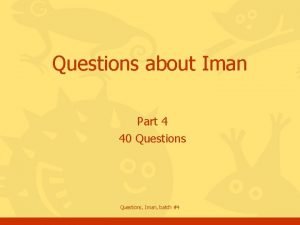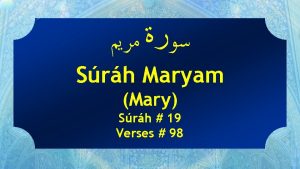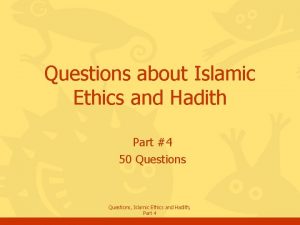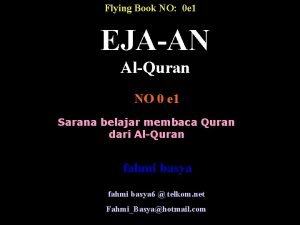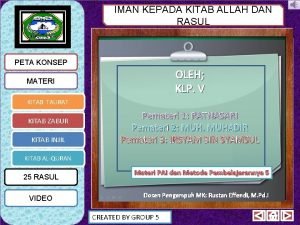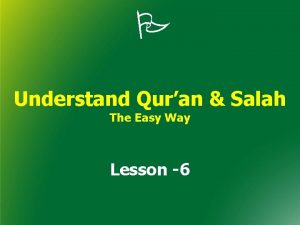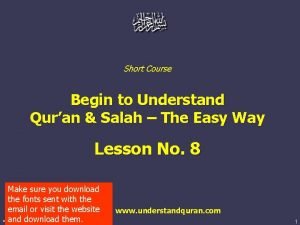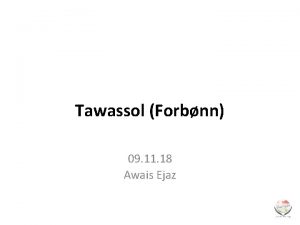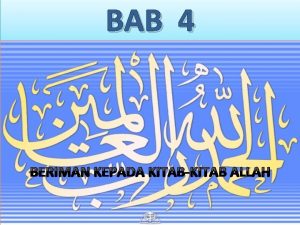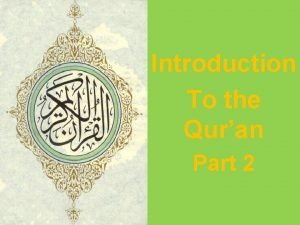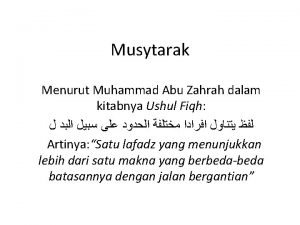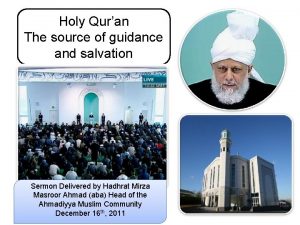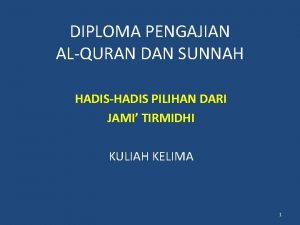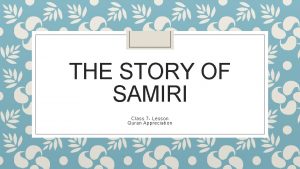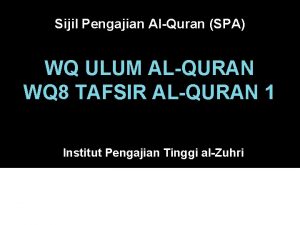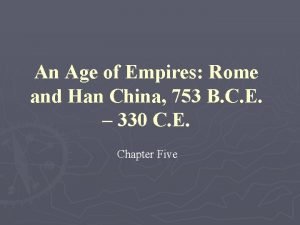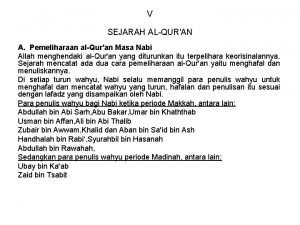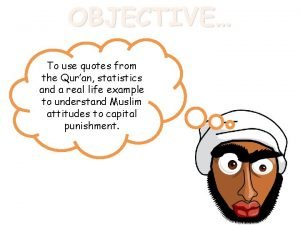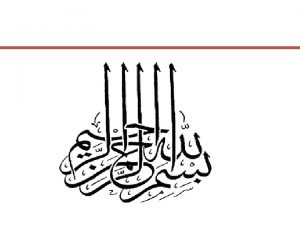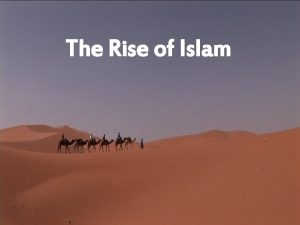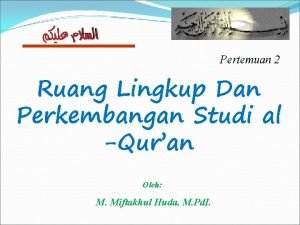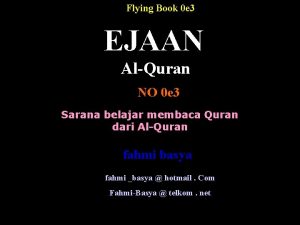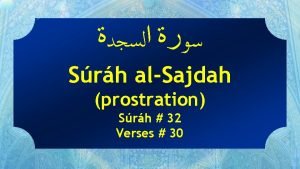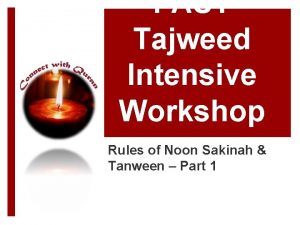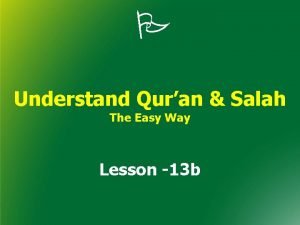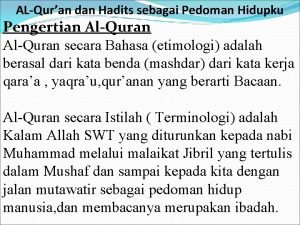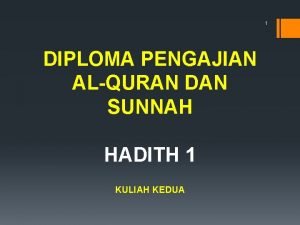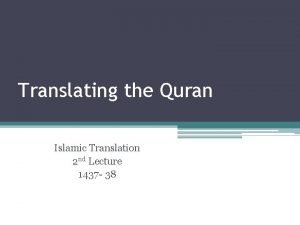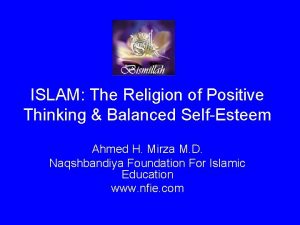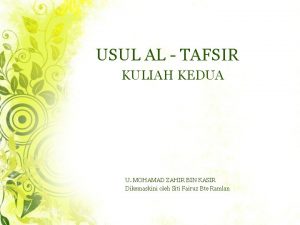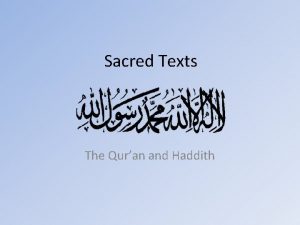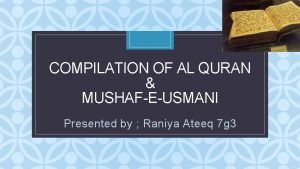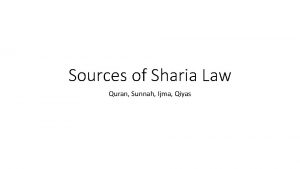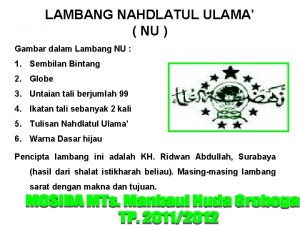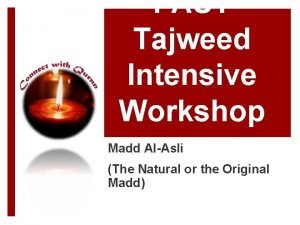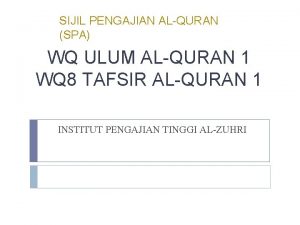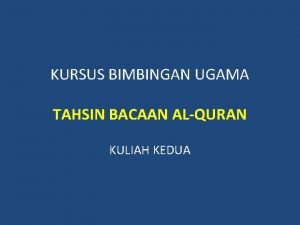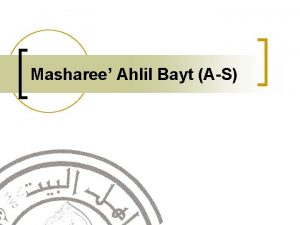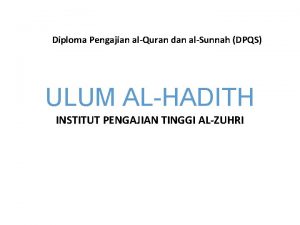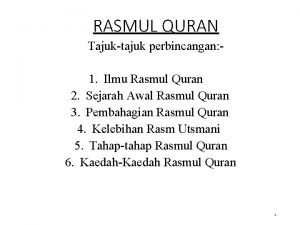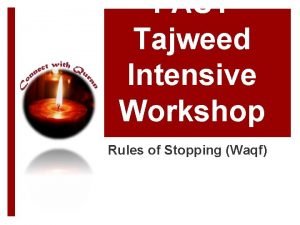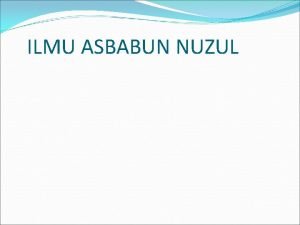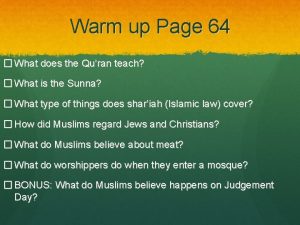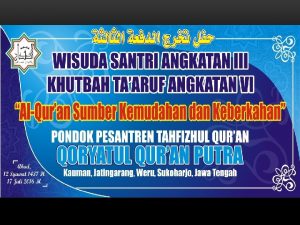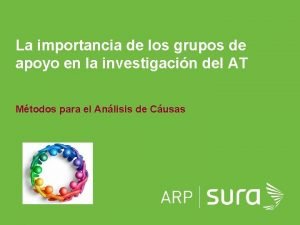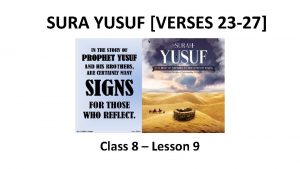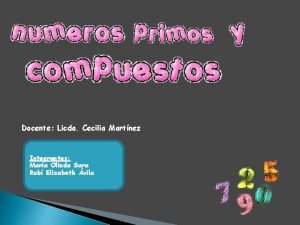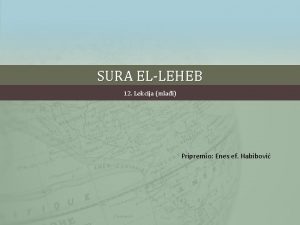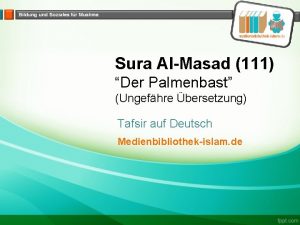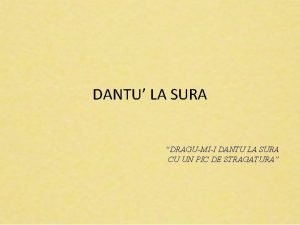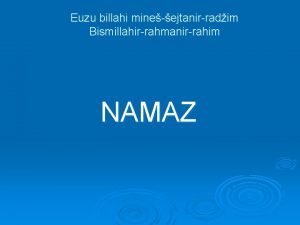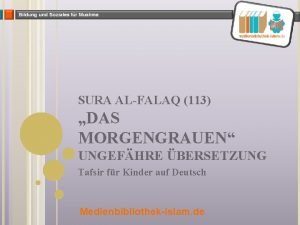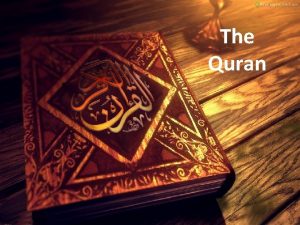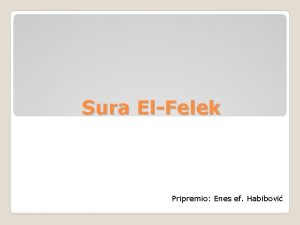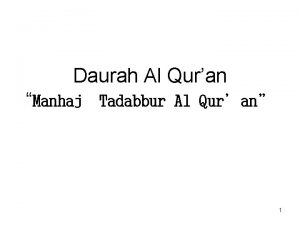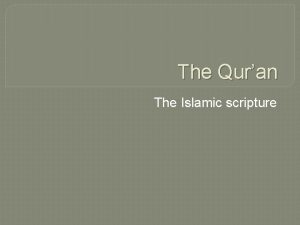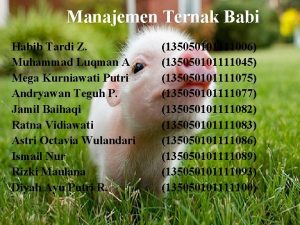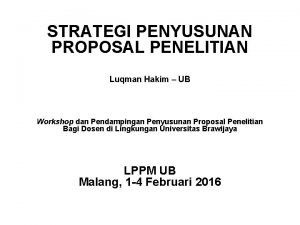QURAN 17 UARC 51 SURA LUQMAN SURA AL

















































































































































![In the name of Allah, the Compassionate, the Merciful. [1 -5] Alif. Lam. Mim. In the name of Allah, the Compassionate, the Merciful. [1 -5] Alif. Lam. Mim.](https://slidetodoc.com/presentation_image_h2/9df11f5a644af6138001031782105352/image-146.jpg)
![[6 -7] And there is among the men such a one also, who buys [6 -7] And there is among the men such a one also, who buys](https://slidetodoc.com/presentation_image_h2/9df11f5a644af6138001031782105352/image-147.jpg)

![[10 -11] He 12 created the heavens without pillars that you could see. He [10 -11] He 12 created the heavens without pillars that you could see. He](https://slidetodoc.com/presentation_image_h2/9df11f5a644af6138001031782105352/image-149.jpg)
![[12] We had bestowed wisdom on Luqman that he may be grateful to Allah. [12] We had bestowed wisdom on Luqman that he may be grateful to Allah.](https://slidetodoc.com/presentation_image_h2/9df11f5a644af6138001031782105352/image-150.jpg)
![[14 -15] And the fact is that We have Our self-enjoined on man to [14 -15] And the fact is that We have Our self-enjoined on man to](https://slidetodoc.com/presentation_image_h2/9df11f5a644af6138001031782105352/image-151.jpg)
![[16 -17] (And Luqman had said: ) "My son, even if a thing be [16 -17] (And Luqman had said: ) "My son, even if a thing be](https://slidetodoc.com/presentation_image_h2/9df11f5a644af6138001031782105352/image-152.jpg)
![[18 -19] And do not speak to the people with your face turned away, [18 -19] And do not speak to the people with your face turned away,](https://slidetodoc.com/presentation_image_h2/9df11f5a644af6138001031782105352/image-153.jpg)
![[20 -21] Do you not see that Allah has subjected to you whatever is [20 -21] Do you not see that Allah has subjected to you whatever is](https://slidetodoc.com/presentation_image_h2/9df11f5a644af6138001031782105352/image-154.jpg)
![[22 -24] Whoever surrenders himself to Allah, and is a doer of good, he [22 -24] Whoever surrenders himself to Allah, and is a doer of good, he](https://slidetodoc.com/presentation_image_h2/9df11f5a644af6138001031782105352/image-155.jpg)
![[25 -26] If you ask them, "Who has created the earth and the heavens? [25 -26] If you ask them, "Who has created the earth and the heavens?](https://slidetodoc.com/presentation_image_h2/9df11f5a644af6138001031782105352/image-156.jpg)
![[27 -28] If all the trees in the earth were to become pens and [27 -28] If all the trees in the earth were to become pens and](https://slidetodoc.com/presentation_image_h2/9df11f5a644af6138001031782105352/image-157.jpg)
![[29 -30] Do you not see that Allah causes the night to pass into [29 -30] Do you not see that Allah causes the night to pass into](https://slidetodoc.com/presentation_image_h2/9df11f5a644af6138001031782105352/image-158.jpg)
![[31 -32] Do you not see that the ship sails in the sea by [31 -32] Do you not see that the ship sails in the sea by](https://slidetodoc.com/presentation_image_h2/9df11f5a644af6138001031782105352/image-159.jpg)
![[33] O people! Avoid the wrath of your Lord and fear the Day when [33] O people! Avoid the wrath of your Lord and fear the Day when](https://slidetodoc.com/presentation_image_h2/9df11f5a644af6138001031782105352/image-160.jpg)
![[34] Allah alone has the knowledge of the Hour: He alone sends down the [34] Allah alone has the knowledge of the Hour: He alone sends down the](https://slidetodoc.com/presentation_image_h2/9df11f5a644af6138001031782105352/image-161.jpg)









- Slides: 170

QURAN 17 UARC 51 SURA LUQMAN SURA AL NOOR Prof. M. Seyid Abdul Kadher Asst. Prof & Head of the Department of Arabic Hajee Karutha Rowther Howdia College Uthamapalayam

COURSE OUTCOMES �Understand the syntax of the Quran �Learn vocabularies of the Quran �Infer and interpret the meaning of the Quran

Introduction Names of Quran Period of Revelation Compilation of Quran

Introduction �The Holy Qurán is the most widely read book in the history of mankind. It is a source of immense inspiration, guidance and wisdom for millions of Muslims all over the world. �It is the pivotal point of imaan(faith), and integral to the foundations of an Islamic society being the basis of its Shariah(Islamic legal injunctions and law). �It is a book not just to be read, but to be studied, understood and ultimately followed.

Names of Qurán The word Quran is derived from the root word “” which means “to read”. The word Quran itself can be found in the scriptures: ﺍ ٱﺍ ﻥ ﻧ ﻥۦ ٱﻳ ٱ "We do relate unto you the most beautiful stories, in that We reveal to thee this (portion of the) Quran: Before this thou too was among those who knew it not. " (Yusuf, 12: 3) ﻯ ﻭ. ﺍ ﻳ "Nay this is a glorious Quran (inscribed) in a tablet preserved". (Al-Buruj, 85: 21 -22)

Names of Qurán However Allah Almighty refers to the Holy Quran using several other names: al-nur the light (7: 157) al-hukm the judgment (13: 37) al-dhikr the reminder (15: 9) al-kitab the scripture (21: 10) al-furqan the criterion (25: 1) al-tanzil the revelation (26: 192) Further descriptive titles include mubarak (blessing), mussadiq (confirmation of truth), mubin (explanation), hakim (wisdom), majid (glorious) and kari m (honoured End of Part I

Period of revelation The first revelation of the Holy Quran took place on the 16 th Ramadhan, A. D 610. The period of revelation spanned 22 years, 2 months and 22 days. There is a traditional division of the Surahs between those that were revealed in the city of Makkah, (Makki Surahs) and those that were revealed in the city of Madinah (Madani Surahs): PERIOD YEARS MONTH S DAY S REVELATION PERIOD 22 2 22 MAKKI PERIOD 12 5 13 MADANI PERIOD 9 9 9 End of Part II

Compilation of Quran �The compilation of the Holy Quran took place in three stages: �During the lifetime of the Holy Prophet (SAL) �During the caliphate of Sayyidina Abu Bakr (RA) �During the caliphate of Sayyidina Othman bin Affan (RA)

In the Lifetime of the Holy Prophet (SAL) � There is ample evidence showing that the entire Quran was written down in the Prophets (SAL) lifetime. As stated earlier when he (SAL) received revelation he would instruct scribes to record the revelation on parchments of paper or pieces of leather. He would also indicate in which Surah each ayah was to be placed. The Companions never interfered in the arrangement of the ayahs and Surahs which are the same in copies of Qurans available today. � Hadrat Zaid bin Thabbit was one of the most prominent of the scribes and has reported that he, along with other companions would compile the Quran in the presence of the Holy Prophet (SAL). During this time the names of the Surahs were also known. � Angle Jibril (A. S. ) would also come to the Holy Prophet (SAL) every Ramadan to listen to him reciting the Quran, and he listened to him twice in the year of his demise.

In the time of Sayyidina Abu Bakr (RA) � After the battle of Yamama during which hundreds of huffaz were martyred, Sayyidina Umar bin Kattab (RA) feared that a large part of the Quran could be lost if the rate of martyrdom increased. He expressed these fears to the Caliph Sayyidina Abu Bakr (RA) and asked him to compile the Qurán into a permanent book form. Sayyidina Abu Bakr (RA) was at first shocked at the request and said he could not do something that the Holy Prophet (SAL) had never done in his own lifetime. However Sayyidina Umar (RA) continued to persuade him until Sayyidina Abu Bakr (RA) said his heart was opened by Allah (SWT) and he agreed to the suggestion.

In the time of Sayyidina Abu Bakr (RA) � Sayyidina Abu Bakr (RA) called upon Hadrat Zaid bin Thabbit (RA) to collect and compile the Quran into one volume. Hadrat Zain bin Thabbit was also astonished at this request and declared it would have been easier for him to shift a mountain than to do such a task. He too questioned how they could do something that the Holy Prophet (SAL) had never done. Sayyidina Abu Bakr (RA) replied this was a good thing and began to persuade him until Allah (SWT) opened the heart of Hadrat Zaid bin Thabbit (RA) who agreed to do this.

In the time of Sayyidina Abu Bakr (RA) � Hadrat Zaid bin Thabbit (RA) set about completing the task. He collected all the written parts of the Quran from date leaves, parchment and pieces of leather and also listened to many of the hafiz who recited verses from their memories. After having carefully compared and cross checked each ayah, he compiled the entire Quran. Sayyidina Abu Bakr became its official custodian, passing on to Sayyidina Umar bin Kattab (RA) after him. The Quranic compilation was passed into the custody of his daughter Hadrat Hafsah (RA) after him.

In the time of Sayyidina Uthman bin Affan (RA) � As the Islamic empire increased it incorporated many different nations and tribes who did not speak and understand Arabic. As a result difference in reciting the Quran and pronunciation began to occur. It is reported by Hadrat Anas bin Malik that Hadrat Hudaifah bin Yaman (RA) had been involved in the victories of the Muslim run Sham, now modern day Syria, and Iraq over Armenia and Azerbaijan. He heard the differences in the recitation of the Quran by the inhabitants there. Upon his return he related these concerns to Sayyidina Uthman (RA) who expressed a deep apprehension at this new development. They both feared conflicts could arise, replicating the problems that had occurred in the authenticity of the Bible and Toroth.

In the time of Sayyidina Uthman bin Affan (RA) � Sayyidina Uthman took action and asked Hadrat Hafsah (RA) for the original volume of the Quran promising to return it to her once copies were made. She sent it immediately to him. Hadrat Zaid bin Thabbit(RA), having been responsible for the first compilation was appointed as the head of a committee to make exact and perfect copies of the original. The other committee members consisted of Hadrat Abdullah bin Zubair, Hadrat Sa’id bin Al A’as and Hadrat Abdur Rahman bin Harith (RA). Hadrat Uthman gave them instructions that if any of the three disagreed upon any point with Hadrat Zaid (RA) then the relevant ayah should be written in the language of the Quraish as that was the tongue in which the Quran was revealed.

In the time of Sayyidina Uthman bin Affan (RA) �Once copies were made the original was returned to Hadrat Hafsah (RA). The new copies were then distributed to every Muslim province with the orders that all other copies of the Quran, be they full or partial copies, were to be burnt and replaced by this original one. Since that day the Holy Qurán has remained in its original pristine form and will remain as such in the future by the Grace and Blessings of Allah Almighty.


End of Part III & Unit I

Introduction

Introduction Name � This Surah takes its name, An Nur, from verse 35. � Period of Revelation � Sura Al Noor was revealed in 6 A. H. after the Campaign against Bani al-Mustaliq. � Historical Background � Now let us review the circumstances existing at the time of the revelation of this surah. It should be kept in mind that the incident of the "Slander", which was the occasion of its revelation, was closely connected with the conflict between Islam and the disbelievers. � After the victory at Badr, the Islamic movement began to gain strength day by day; so much so that by the time of the Battle of the Trench, it had become so strong that the united forces of the enemy numbering about ten thousand failed to crush it and had to raise the siege of Al Madinah after one month. �

Introduction � When the disbelievers realized that they could not defeat Islam on the battlefield, they chose the moral front to carry on the conflict. It cannot be said with certainty whether this Change of tactics was the outcome of deliberate consultations, or it was the inevitable result of the humiliating retreat in the Battle of the Trench, for which all the available forces of the enemy had been concentrated. They knew it well that the rise of Islam was neither due to the numerical strength of the Muslims nor due to their superior arms and ammunition or greater material resources. The Muslims were fighting against fearful odds on all these fronts. They owed their success to their moral superiority. Their enemies realized that the pure and noble qualities of the Holy Prophet and his followers were capturing the hearts of the people, and were also binding them together into a highly disciplined community. As a result of this, they were defeating the mushriks and the Jews both on the peace and on the war front, because the latter lacked discipline and character.

Introduction � Under the above mentioned circumstances, the wicked designs of the disbelievers led them to start a campaign of vilification against the Holy Prophet and the Muslims in order to destroy the bulwark of morale that was helping them to defeat their enemies. Therefore the strategy was to attain the assistance of the hypocrites to spread slanders against the Holy Prophet and his followers so that the mushriks and the Jews could exploit these to sow the seeds of discord among the Muslims and undermine their discipline. � The first opportunity for the use of the new strategy was afforded in Zil-Qa'dah 5 A. H. when the Holy Prophet married Hadrat Zainab (daughter of Jahsh), who was the divorced wife of his adopted son, Zaid bin Harithah. The Holy Prophet had arranged this marriage in order to put an end to the custom of ignorance, which gave the same status to the adopted son that was the right only of the son from one's own loins.

The hypocrites, however, considered it a golden opportunity to vilify the Holy Prophet from inside the community, and the Jews and the mushriks exploited it from outside to ruin his high reputation by this malicious slander. For this purpose fantastic stories were concocted and spread to this effect: "One day Muhammad (Allah's peace be upon him) happened to see the wife of his adopted son and fell in love with her; he maneuvered her divorce and married her. " Though this was an absurd fiction it was spread with such skill, cunning and artfulness that it succeeded in its purpose; so much so that some Muslim traditionalists and commentators also have cited some parts of it in their writings, and the orientalists have exploited these fully to vilify the Holy Prophet. � As a matter of fact, Hadrat Zainab was never a stranger to the Holy Prophet that he should see her by chance and fall in love with her at first sight. For she was his first cousin, being the daughter of his real paternal aunt, Umaimah, daughter of Abdul Muttalib. He had known her from her childhood to her youth. A year before this incident, he himself had persuaded her to marry Hadarat Zaid in order to demonstrate practically that the Quraish and the liberated slaves were equal as human being. As she never reconciled herself to her marriage with a liberated slave, they could not pull on together for long, which inevitably led to her divorce. The above mentioned facts were well known to all, yet the slanderers succeeded in their false propaganda with the result that even today there are people who exploit these things to defame Islam. �

Introduction � The second slander was made on the honor of Hadrat Ayesha, a wife of the Holy Prophet, in connection with an incident which occurred while he was returning from the Campaign against Bani al-Mustaliq. As this attack was even severer than the first one and was the main background of this Surah, we shall deal with it in greater detail. � Let us say a few words about Abdullah bin Ubayy, who played the part of a villain in this attack. He belonged to the clan of Khazraj and was one of the most important chiefs of Al-Madinah. The people had even intended to make him their king a little before the Holy Prophet's migration there, but the scheme had to be dropped because of the changed circumstances. Though he had embraced Islam, he remained at heart a hypocrite and his hypocrisy was so manifest that he was called the "Chief of the Hypocrites". He never lost any opportunity to slander Islam in order to take his revenge.

Introduction When in Sha'ban 6 A. H. the Holy Prophet learned that the people of Bani al-Mustaliq were making preparations for a war against the Muslims and were trying to muster other clans also for this purpose. The Prophet took them by surprise by initiating an attack against them. After capturing the people of the clan and their belongings, the Holy Prophet made a halt near Muraisi, a spring in their territory. � One day a dispute concerning taking water from the spring started between a servant of Hadrat Umar and an ally of the clan of Khazraj, and developed into a quarrel between the Muhajirs(immigrants) and the Ansar(Muslims of Madinah), but was soon settled. This, however, did not suit the strategy of Abdullah bin Ubayy, who also had joined the expedition with a large number of hypocrites. So he began to incite the Ansar, saying, "You yourselves brought these people of the Quraish from Makkah and made them partners in your wealth and property. And now they have become your rivals and want domination over you. If even now you withdraw your support from them, they shall be forced to leave your city. " Then he swore and declared, "As soon as we reach back Al-Madinah, the respectable people will turn out the degraded people from the city. " �

Introduction � When the Holy Prophet came to know of this, he ordered the people to set off immediately and march back to Al-Madinah. The forced march continued up to noon the next day without a halt on the way so that the people became exhausted and had no time for idle talk. � Though this wise judgment and quick action by the Holy Prophet averted the undesirable consequences of the mischief, Abdullah bin Ubayy got another opportunity for doing a far more serious and greater mischief, i. e. by engineering a "Slander" against Hadrat Ayesha, for that was a mischief which might well have involved the young Muslim Community in a civil war, if the Holy Prophet and his sincere and devoted followers had not shown wisdom, forbearance and marvelous discipline in dealing with it.

Introduction In order to understand the events that led to the incident of the "Slander", we cite the story in Hadrat 'Ayesha's own words. She says : � "Whenever the Holy Prophet went out on a journey, he decided by lots as to which of his wives should accompany him. Accordingly, it was decided that I should accompany him during the expedition to Bani al Mustaliq. On the return journey, the Holy Prophet halted for the night at a place which was the last stage on the way back to Al- Madinah. It was still night, when they began to make preparations for the march. So I went outside the camp to ease myself. When I returned and came near my halting place, I noticed that my necklace had fallen down somewhere. I went back in search for it but in the meantime the caravan moved off and I was left behind all alone. The four carriers of the litter had placed it on my camel without noticing that it was empty. This happened because of my light weight due to lack of food in those days. I wrapped myself in my sheet and lay down in the hope that when it would be found that I had been left behind, a search party would come back to pick me up. In the meantime I fell asleep. In the morning, when Safwan bin Mu'attal Sulami passed that way, he saw me and recognized me for he had seen me several times before the Commandment about purdah had been sent down. No sooner did he see me than he stopped his camel and cried out spontaneously : "How sad! The wife of the Holy Prophet has been left here!" At this I woke up all of a sudden and covered my face with my sheet. Without uttering another word, he made his camel kneel by me and stood aside, while I climbed on to the camel back. He led the camel by the nose-string and we overtook the caravan at about noon, when it had just halted and nobody had yet noticed that I had been left behind. I learnt afterwards that this incident had been used to slander me and Abdullah bin Ubayy was foremost among the slanderers. �

Introduction "When I reached Al-Madinah, I fell ill and stayed in bed for more than a month. Though I was quite unaware of it, the news of the "Slander" was spreading like a scandal in the city, and had also reached the Holy Prophet. Anyhow, I noticed that he did not seem as concerned about my illness he used to be. He would come but without addressing me directly, would inquire from others how I was and leave the house. Therefore it troubled my mind that something had gone wrong somewhere. So I took leave of him and went to my mother's house for better nursing. � "While I was there, one night I went out of the city to ease myself in the company of Mistah's mother, who was a first cousin of my mother. As she was walking along she stumbled over something and cried out spontaneously, 'May Mistah perish!' To this I retorted, 'What a good mother you are that you curse your own son -- the son who took part in the Battle of Badr. ' She replied, 'My dear daughter, are you not aware of his scandal mongering? ' Then she told me everything about the campaign of the "Slander". (Besides the hypocrites, some true Muslims also had been involved in this campaign, and among them who took leading part in it, were Mistah, Hassan bin Thabit, the famous poet of Islam, and Hamnah, daughter of Jahsh and sister of Hadrat Zainab). Hearing this horrible story, my blood curdled, and I immediately returned home, and passed the rest of the night in crying over it. �

Introduction � "During my absence the Holy Prophet took counsel with Ali and Usamah bin Zaid about this matter. Usamah said good words about me to this effect: 'O Messenger of Allah, we have found nothing but good in your wife. All that is being spread about her is a lie and calumny. ' As regards Ali, he said, 'O Messenger of Allah, there is no dearth of women; you may, if you like, marry an other wife. If, how- ever, you would like to investigate into the matter, you may send for her maid servant and inquire into it through her. ' Accordingly, the maid servant was sent for and questioned. She replied, 'I declare on an oath by Allah, Who has sent you with the Truth, that I have never seen any evil thing in her, except that she falls asleep when I tell her to look after the kneaded dough in my absence and a goat comes and eats it. '

Introduction � "On that same day the Holy Prophet addressed the people from the pulpit, saying: 'O Muslims, who from among you will defend my honor against the attacker of the person who has transgressed all bounds in doing harm to me by slandering my wife. By God, I have made a thorough inquiry and found nothing wrong with her nor with the man, whose name has been linked with the "Slander". At this Usaid bin Hudair (or Sa'd bin Mauz) according to other traditions) stood up and said, 'O Messenger of Allah, if that person belongs to our clan, we will kill him by ourselves, but if he belongs to the Khazraj clan, we will kill him if you order us to do so. ' Hearing this Sa'd bin 'Ubadah, chief of the Khazraj clan, stood up and said, 'You lie you can never kill him. You are saying this just because the person belongs to our clan of Khazraj. Had he belonged to your clan, you would never have said so. ' Hadrat Usaid retorted, 'You are a hypocrite: that is why you are defending a hypocrite. ' At this, there was a general turmoil in the mosque, which would have developed into a riot, even though the Holy Prophet was present there the whole time. But he cooled down their anger and came down from the pulpit. "

Introduction �The remaining details of the incident will be cited along with our commentary on the Text, which honorably absolved Hadrat Aishah from the blame. But here we would only want to point out the enormity of the mischief that was engineered by Abdullah bin Ubayy: (1) It implied an attack on the honor of the Holy Prophet and Hadrat Abu Bakr Siddiq. (2) He meant to undermine the high moral superiority which was the greatest asset of the Islamic Movement (3) He intended to ignite civil war between the Muhajirs and the Ansar, and between Aus and Khazraj, the two clans of the Ansar.

Introduction This Surah and vv. 28 -73 of Surah Al-Ahzab(of which this is the sequel) were sent down to strengthen the moral front, which at that time was the main target of the attack, vv. 28 -73 of Al-Ahzab were sent down concerning the Holy Prophet's marriage with Hadrat Zainab, and on the occasion of the second attack (the "Slander" about Hadrat Aishah), Surah An-Nur was sent down to repair the cracks that had appeared in the unity of the Muslim Community. If we keep this in view during the study of the two Surahs, we shall understand the wisdom that underlies the Commandments about purdah. Allah sent the following instructions to strengthen and safeguard the moral front, and to counteract the storm of propaganda that was raised on the occasion of the marriage of Hazrat Zainab: � The wives of the Holy Prophet were enjoined to remain within their private quarters, to avoid display of adornments and to be cautious in their talk with other persons (vv. 32, 33). � The other Muslims were forbidden to enter the private rooms of the Holy Prophet and instructed to ask whatever they wanted from behind the curtain. (v. 53). �

Introduction �A line of demarcation was drawn between the mahram and the non-mahram relatives. Only the former were allowed to enter the private rooms of those wives of the Holy Prophet with whom they were so closely related as to prohibit marriage with them. (v. 55). � The Muslims were told that the wives of the Prophet were prohibited for them just like their own real mothers; therefore every Muslim should regard them with the purest of intentions. (vv. 53, 54). � The Muslims were warned that they would invite the curse and scourge of Allah if they offended the Holy Prophet. Likewise it was a heinous sin to attack the honor of or slander any Muslim man or woman. (vv. 57, 58). � All the Muslim women were enjoined to cover their faces with their sheets if and when they had to go out of their houses. (v. 59).

Introduction On the occasion of the second attack, this Surah was sent down to keep pure and strengthen the moral fiber of the Muslim society, which had been shaken by the enormity of the slander. We give below a summary of the Commandments and instructions in their chronological order so that one may understand how the Quran makes use of the psychological occasion to reform the Community by the adoption of legal, moral and social measures. � Fornication which had already been declared to be a social crime (IV: 15, 16) was now made a criminal offense and was to be punished with a hundred lashes. � It was enjoined to boycott the adulterous men and women and the Muslims were forbidden to have any marriage relations with them. � The one, who accused the other of adultery but failed to produce four witnesses, was to be punished with eighty lashes. � The Law of Li'an was prescribed to decide the charge of adultery against his own fife by a husband. �

Introduction � The Muslims were enjoined to learn a lesson from the incident of the "Slander" about Hadrat Aishah, as if to say, "You should be very cautious in regard to charges of adultery against the people of good reputation, and should not spread these; nay, you should refute and suppress them immediately. " In this connection, a general principle was enunciated that the proper spouse for a pure man is a pure woman, for he cannot pull on with a wicked woman for long, and the same is the case with a pure woman, as if to say, "When you knew that the Holy Prophet was a pure man, nay, the purest of all human beings, how could you believe that he had experienced happiness with a wicked woman and exalted her as the most beloved of his wives? For it was obvious that an adulterous woman could not have been able to deceive, with her affected behavior, a pure man like the Holy Prophet. You ought also to have considered the fact that the accuser was a mean person while the accused was a pure woman. This should have been enough to convince you that the accusation was not worth your consideration; nay, it was not even conceivable.

Introduction � Those who spread news and evil rumors and propagate wickedness in the Muslim Community, deserve punishment and not encouragement. � A general principle was laid down that relations in the Muslim Community should be based on good faith and not on suspicion: everyone should be treated as innocent unless he is proved to be guilty and vice versa. � The people were forbidden to enter the houses of others unceremoniously and were instructed to take permission for this. � Both men and women were instructed to lower their gaze and forbidden to cast glances or make eyes at each other. � Women were enjoined to cover their heads and breasts even inside their houses.

Introduction � Women were forbidden to appear with make-up before other men except their servants or such relatives with whom their marriage is prohibited. � They were enjoined to hide their make-ups when they went out of their houses, and even forbidden to put on jingling ornaments, while they moved out of their houses. � Marriage was encouraged and enjoined even for slaves and slave girls, for unmarried people help spread indecency. � The institution of slavery was discouraged and the owners and other people were enjoined to give financial help to the slaves to earn their freedom under the law of Mukatabat. � Prostitution by slave girls was forbidden in the first instance, for prostitution in Arabia was confined to this class alone. This in fact implied the legal prohibition of prostitution.

Introduction Sanctity of privacy in home life was enjoined even for servants and under age children including one's own. They were enjoined not to enter the private rooms of any man or woman without permission; especially in the morning, at noon and at night. � Old women were given the concession that they could set aside their head covers within their houses but should refrain from display of adornments. Even they were told that it was better for them to keep themselves covered with head wrappers. � The blind, lame, crippled and sick persons were allowed to take any article of food from the houses of other people without permission, for it was not to be treated like theft and cheating, which are cognizable offenses. � On the other hand, the Muslims were encouraged to develop mutual relationships by taking their meals together, and the nearest relatives and intimate friends were allowed to take their meals in each other's house without any formal invitation. This was to produce mutual affection and sincere relationships between them to counteract any future mischief. Side by side with these instructions, clear signs of the Believers and the hypocrites were stated to enable every Muslim to discriminate between the two. At the same time the Community was bound together by adopting disciplinary measures in order to make it stronger and firmer than it was at the time so as to discourage the enemies from creating mischief in it. �

Introduction � Above all, the most conspicuous thing about this discourse is that it is free from the bitterness which inevitably follows such shameful and absurd attacks. Instead of showing any wrath at this provocation, the discourse prescribes some laws and regulations and enjoins reformative commandments and issues wise instructions that were required at the time for the education and training of the Community. Incidentally, this teaches us how to deal with such provocative mischiefs coolly, wisely and generously. At the same time, it is a clear proof that this is not the word of Prophet Muhammad (Allah's peace and blessings be upon him) but of a Being Who is observing all human conditions and affairs from the highest level, and guiding mankind without any personal prejudices, feelings and leanings. Had this been the word of the Holy Prophet; there would have been at least some tinge of natural bitterness in spite of his great generosity and forbearance, for it is but human that a noble man naturally become enraged when his own honor is attacked in this mean manner.

Detailed notes

THE ETIQUETTE OF WOMEN WALKING IN THE STREET • Allah's saying: ﴾ • ﴿ ﺍ ﺽﺏ ﺭ • (And let them not stamp their feet. . . ) During Jahiliyyah, when women walked in the street wearing anklets and no one could hear them, they would stamp their feet so that men could hear their anklets ringing. Allah forbade the believing women to do this. By the same token, if there is any other kind of adornment that is hidden, women are forbidden to make any movements that would reveal what is hidden, because Allah says: ﴾ • ﴿ ﺍ ﺽﺏ ﺭ • (And let them not stamp their feet. . . ) to the end of it.

THE ETIQUETTE OF WOMEN WALKING IN THE STREET • From that, women are also prohibited from wearing scent and perfume when they are going outside the home, lest men should smell their perfume. Abu `Isa At-Tirmidhi recorded that Abu Musa (may Allah be pleased with him) said that the Prophet said: « ﺍ ﺍ ﺍ ، • » ﺍ • (Every eye commits fornication and adultery, and when a woman puts on perfume and passes through a gathering, she is such and such) -- meaning an adulteress. He said, "And there is a similar report from Abu Hurayrah, and this is Hasan Sahih. '' It was also recorded by Abu Dawud and An -Nasa'i. By the same token, women are also forbidden to walk in the middle of the street, because of what this involves of wanton display.

THE ETIQUETTE OF WOMEN WALKING IN THE STREET • Abu Dawud recorded that Abu Usayd Al-Ansari said that he heard the Messenger of Allah, as he was coming out of the Masjid and men and women were mixing in the street, telling the women: « ﺍ ﺍ ﺍﻟ ﻳ ، ﺍﻟ ﻳ • » ﺍ • (Keep back, for you have no right to walk in the middle of the street. You should keep to the sides of the road. ) The women used to cling to the walls so much that their clothes would catch on the walls. ﴾ • ﴿ ﻭ ﻯ ٱﻠ ﻳﺍ ٱﻞﺅﻭ ﻡ ﻑﻭ • (And all of you beg Allah to forgive you all, O believers, that you may be successful. ) means, practice what you are commanded in these beautiful manners and praiseworthy characteristics, and give up the evil ways of the people of Jahiliyyah, for the greatest success is to be found in doing what Allah and His Messenger command avoiding what He forbids. And Allah is the source of strength.


• (32. And marry those among you who are single (Al-Ayama) and the pious of your servants and maidservants. If they be poor, Allah will enrich them out of His bounty. And Allah is All-Sufficient, All. Knowing. ) (33. And let those who find not the financial means for marriage keep themselves chaste, until Allah enriches them of His bounty. And such of your servants as seek a writing (of emancipation), give them such writing, if you find that there is good and honesty in them. And give them something (yourselves) out of the wealth of Allah which He has bestowed upon you. And force not your slave-girls to prostitution, if they desire chastity, in order that you may make a gain in the goods of this worldly life. But if anyone compels them, then after such compulsion, Allah is Oft. Forgiving, Most Merciful. ) (34. And indeed We have sent down for you Ayat that make things plain, and the example of those who passed away before you, and an admonition for those who have Taqwa. )

THE COMMAND TO MARRY • These clear Ayat include a group of unambiguous rulings and firm commands. ﴾ • ﴿ ﻧﻭ ٱﻞـﻯ ﻧﻡ • (And marry those among you who are single (Al-Ayama). . . ) This is a command to marry. The Prophet said: « ﺍﻟ ﺍ ، ، ﺍﺍ ﺍﺍ ، • » ﺍ ﺍﻟ ﺍ • (O young men, whoever among you can afford to get married, let him marry, for it is more effective in lowering the gaze and protecting the private parts. Whoever cannot do that, then let him fast, for it is a protection for him. ) This was recorded in the Two Sahihs from the Hadith of Ibn Mas`ud.

THE COMMAND TO MARRY • In the Sunan, it was recorded from more than one person that the Messenger of Allah said: « • » ﻭﺍ ﺍﻭﺍ ﻱ ﺍ ﺍ ﺍﺍ • (Marry and have children, for I will be proud of you before the nations on the Day of Resurrection. ) The word Al-Ayama, the plural form of Ayyim, is used to describe a woman who has no husband a man who has no wife, regardless of whether they have been married and then separated, or have never been married at all. Al. Jawhari reported this from the scholars of the (Arabic) language, and the word is applied to men and women alike. ﴾ • ﴿ ﻥ ﻭﻭ ﻍ ٱﻠ ﻥ ﺽۦ • (If they be poor, Allah will enrich them out of His bounty. ) `Ali bin Abi Talhah reported from Ibn `Abbas: "Allah encouraged them to get married, commanded both free men and servants to get married, and He promised to enrich them. ''

THE COMMAND TO MARRY ﴾ • ﴿ ﻥ ﻭﻭ ﻍ ٱﻠ ﻥ ﺽۦ • (If they be poor, Allah will enrich them out of His bounty. ) It was recorded that Ibn Mas`ud said: "Seek the richness through marriage, for Allah says: ﴾ • ﴿ ﻥ ﻭﻭ ﻍ ٱﻠ ﻥ ﺽۦ • (If they be poor, Allah will enrich them out of His bounty. )'' This was recorded by Ibn Jarir. Al-Baghawi also recorded something similar from `Umar. It was reported from Al-Layth from Muhammad bin `Ajlan from Sa`id Al-Maqburi from Abu Hurayrah that the Messenger of Allah said: « ﺍﺍﻱ ﻱ ﻳ ﺍﻟﻠ ، ﺍﺍ ﻳ ﺍﺍ ، ﺍﻟ ﺍ ﻳ ﺍﺍ : • » ﺍ ﻯ ﺍﻟﻠ • (There are three whom it is a right upon Allah to help: one who gets married seeking chastity; a slave who makes a contract with his master with the aim of buying his freedom; and one who fights for the sake of Allah. ) This was recorded by Imam Ahmad, At-Tirmidhi, An-Nasa'i and Ibn Majah. The Prophet performed the marriage of a man who owned nothing but his waist wrap, and could not even buy a ring made of iron, but he still married him to that woman, making the Mahr his promise to teach her whatever he knew of the Quran. And it is known from the generosity and kindness of Allah that He provided him with whatever was sufficient for her and for him.

THE COMMAND TO KEEP ONESELF CHASTE IF ONE IS NOT ABLE TO GET MARRIED • Allah's saying: ﴾ • ﴿ ﻝﺱﻉ ٱﻳ ﺍ ﻭ ﺍﺍ ﻯ ﻍ ٱﻠ ﻥ ﺽۦ • (And let those who find not the financial means for marriage keep themselves chaste, until Allah enriches them of His bounty. ) This is a command from Allah to those who do not have the means to get married: they are to keep themselves chaste and avoid unlawful things, as the Prophet said: « ﺍﻟ ﺍ ، • » ﺍ ﺍﻟ ﺍ ﺍﺍ ﺍﺍ • (O young men, whoever among you can afford to get married, let him marry, for it is more effective in lowering the gaze and protecting the private parts. Whoever cannot do that, then let him fast, for it is a protection for him. )

THE COMMAND TO KEEP ONESELF CHASTE IF ONE IS NOT ABLE TO GET MARRIED • This Ayah is general in meaning, and the Ayah in Surat An-Nisa' is more specific, where Allah says: ﴾ • ﴿ ﻥ ﻡ ﺱﻉ ﻧﻡ ﻭﻻ ﻥ ﻧ ٱﻞﺡـ • (And whoever of you have not the means wherewith to wed free believing women)until His statement; ﴾ • ﴿ ﻥ ﺹﻭ ﻱ ﻡ • (but it is better for you that you practice self-restraint) (4: 25) meaning, it is better for you to be patient and refrain from marrying slave-girl, because any child that is born will also be a slave.

THE COMMAND TO KEEP ONESELF CHASTE IF ONE IS NOT ABLE TO GET MARRIED ﴾ • ﴿ ٱﻠ ﻭ ﻳ • (and Allah is Oft-Forgiving, Most Merciful) (4: 25). ﴾ • ﴿ ﻝﺱﻉ ٱﻳ ﺍ ﻭ ﺍﺍ • (And let those who find not the financial means for marriage keep themselves chaste, ) `Ikrimah said, "This refers to a man who sees a woman and it is as if he feels desire; if he has a wife then let him go to her and fulfill his desire with her, and if he does not have a wife, then let him ponder the kingdom of heaven and earth until Allah grants him means of livelihood. ''

THE PARABLE OF THE LIGHT OF ALLAH • `Ali bin Abi Talhah reported that Ibn `Abbas said: ﴾ • ﴿ ٱﻠ ﻭ ٱﻠ ـٲ ٱﻞﺭ • (Allah is the Light of the heavens and the earth. ) means, the Guide of the inhabitants of the heavens and the earth. Ibn Jurayj said: "Mujahid and Ibn `Abbas said concerning the Ayah: ﴾ • ﴿ ٱﻠ ﻭ ٱﻠ ـٲ ٱﻞﺭ • (Allah is the Light of the heavens and the earth. ) He is controlling their affairs and their stars and sun and moon. '' As-Suddi said concerning the Ayah: ﴾ • ﴿ ٱﻠ ﻭ ٱﻠ ـٲ ٱﻞﺭ • (Allah is the Light of the heavens and the earth. ) by His Light the heavens and earth are illuminated.

• In the Two Sahihs, it is recorded that Ibn `Abbas (may Allah be pleased with him) said: "When the Messenger of Allah got up to pray at night, he would say: « ﺍ ﻭ ﺍﻟ ﺍ ﺍ ﻳ ، • » ﺍﻟ ﺍ • (O Allah, to You be praise, You are the Sustainer of heaven and earth and whoever is in them. To You be praise, You are the Light of the heavens and the earth and whoever is in them. ) It was narrated that Ibn Mas`ud said, "There is no night or day with your Lord; the Light of the Throne comes from the Light of His Face. ''

﴾ • ﴿ ﻭۦ • (The parable of His Light) There are two views concerning the meaning of the pronoun (His). The first is that it refers to Allah, may He be glorified and exalted, meaning that the parable of His guidance in the heart of the believer is ﴾ • ﴿ ﺵﻭ • (as a niche) This was the view of Ibn `Abbas. The second view is that the pronoun refers to the believer, which is indicated by the context of the words and implies that the parable of the light in the heart of the believer is as a niche. So the heart of the believer and what he is naturally inclined to of guidance and what he learns of the Quran which is in accordance with his natural inclinations are, as Allah says: ﴾ • ﴿ ﻥ ﺍ ﻯ ﻥ ۦ ﺕﻭ ﺍ ﻥ • (Can they who rely on a clear proof from their Lord, and whom a witness from Him recites it (can they be equal with the disbelievers)) (11: 17). The heart of the believer in its purity and clarity is likened to a lamp in transparent and jewel-like glass, and the Quran and Shari`ah by which it is guided are likened to good, pure, shining oil in which there is no impurity or deviation.

﴾ • ﴿ ﺵﻭ • (as (if there were) a niche) Ibn `Abbas, Mujahid, Muhammad bin Ka`b and others said, "This refers to the position of the wick in the lamp. '' This is well-known, and hence Allah then says: ﴾ • ﴿ ﻳﺍ ﺹﺍ • (and within it a lamp. ) This is the flame that burns brightly. Or it was said that the niche is a niche in the house. This is the parable given by Allah of obedience towards Him. Allah calls obedience to Him as light, then He calls it by other numerous names as well. Ubayy bin Ka`b said, "The lamp is the light, and this refers to the Quran and the faith that is in his heart. '' As-Suddi said, "It is the lamp. '' ﴾ • ﴿ ٱﻞﺹﺍ ﻯ ﺍ • (the lamp is in a glass, ) means, this light is shining in a clear glass. Ubayy bin Ka`b and others said, "This is the likeness of the heart of the believer. ''

﴾ • ﴿ ٱﻠ ﺍ ﺍ ﻭ • (the glass as it were a star Durriyyun, ) Some authorities recite the word Durriyyun with a Dammah on the Dal and without a Hamzah, which means pearls, i. e. , as if it were a star made of pearls (Durr). Others recite it as Dirri'un or Durri'un, with a Kasrah on the Dal, or Dammah on the Dal, and with a Hamzah at the end, which means reflection (Dir'), because if something is shone on the star it becomes brighter than at any other time. The Arabs call the stars they do not know Darari. Ubayy bin Ka`b said: a shining star. Qatadah said: "Huge, bright and clear. '' ﴾ • ﴿ﻭﻥ ـ • (lit from a blessed tree, ) means, it is derived from olive oil, from a blessed tree.

﴾ • ﴿ ﻱﻭ • (an olive, ) This refers to the blessed tree mentioned previously. ﴾ • ﴿ﺍﺭ ﺍﺭ • (neither of the east nor of the west, ) means, it is not in the eastern part of the land so that it does not get any sun in the first part of the day, nor is it in the western part of the land so that it is shaded from the sun before sunset, but it is in a central position where it gets sun from the beginning of the day until the end, so its oil is good and pure and shining.

• Ibn Abi Hatim recorded that Ibn `Abbas commented on: ﴾ • ﴿ ﻱﻭ ﺍ ﺭ • (an olive, neither of the east nor of the west, ) "This is a tree in the desert which is not shaded by any other tree or mountain or cave, nothing covers it, and this is best for its oil. '' Mujahid commented on: ﴾ • ﴿ﺍﺭ ﺍﺭ • (neither of the east nor of the west, ) saying; "It is not in the east where it will get no sun when the sun sets, nor is it in the west where it will get no sun when the sun rises, but it is in a position where it will get sun both at sunrise and sunset. ''

• Sa`d bin Jubayr commented: ﴾ • ﴿ ﻱﻭ ﺍ ﺭ ﺍ ﻱﺍ • (an olive, neither of the east nor of the west, whose oil would almost glow forth (of itself)) "This is the best kind of oil. When the sun rises it reaches the tree from the east and when it sets it reaches it from the west, so the sun reaches it morning and evening, so it is not counted as being in the east or in the west. '' ﴾ • ﴿ ﺍ ﻱﺍ ﻭ ﻡ ﻡﺱ ﺍ • (whose oil would almost glow forth (of itself), though no fire touched it. ) `Abdur-Rahman bin Zayd bin Aslam said (this means) because the oil itself is shining.

﴾ • ﴿ ﻭﻯﻭ • (Light upon Light!) Al-`Awfi narrated from Ibn `Abbas that this meant the faith and deeds of a person. As-Suddi said: ﴾ • ﴿ ﻭﻯﻭ • (Light upon Light!) "Light of the fire and the light of the oil: when they are combined they give light, and neither of them can give light without the other. Similarly the light of the Quran and the light of faith give light when they are combined, and neither can do so without the other. ''

﴾ • ﴿ ہﻯ ٱﻠ ﻭۦ ﻥ • (Allah guides to His Light whom He wills. ) means, Allah shows the way to the ones whom He chooses, as it says in the Hadith recorded by Imam Ahmad from `Abdullah bin `Amr, who said, "I heard the Messenger of Allah say: « ﺍ ﻯ ﺍﻟﻠ : ﺍ ﻭ ﺍﻯ ﻭ ، • » ﺍﻟﻠ ﺍﻯ ﻱ ﻯ ﻭ • (Allah created His creation in darkness, then on the same day He sent His Light upon them. Whoever was touched by His Light on that day will be guided and whoever was missed will be led astray. Hence I say: the pens have dried in accordance with the knowledge of Allah, may He be glorified. )''

﴾ • ﴿ ﺽ ٱﻠ ٱﻞﻡـ ﻟ ﺍ ٱﻠ ﻯ ﻳ • (And Allah sets forth parables for mankind, and Allah is All-Knower of everything. ) Having mentioned this parable of the Light of His guidance in the heart of the believer, Allah ends this Ayah with the words: ﴾ • ﴿ ﺽ ٱﻠ ٱﻞﻡـ ﻟ ﺍ ٱﻠ ﻯ ﻳ • (And Allah sets forth parables for mankind, and Allah is All-Knower of everything. ) meaning, He knows best who deserves to be guided and who deserves to be led astray.

• ، « • Imam Ahmad recorded that Abu Sa`id Al-Khudri said, "The Messenger of Allah said: ﺍﻳﺍ ﻳ ﺍ ﺍ ﺍﺍ ﺍﻟ ، ﺍ ﺍ ﺍ ﻳ ﻳﺍ ﺍ ، ، ﺍ ﺍ ﺍﻭ ﺍﺍ ، ﺍ ﺍ ﻳ ﻭ : ﺍ ﺍ ﺍ. ، ﻭ ﻯ ﺍ ، ﻳ ﺍﻟ ﺍ : • » ﺍﻭ ﺍﻣ ﻯ ﺍﻯ ، ﺍﻟ ﺍ ﻳ ﺍ ﺍ ﺍﻟ ﺍ (Hearts are of four kinds: the heart that is clear like a shining lamp; the heart that is covered and tied up; the heart that is upside-down; and the heart that is clad in armor. As for the clear heart, it is the heart of the believer in which is a lamp filled with light; as for the covered heart, this is the heart of the disbeliever; as for the upside-down heart, this is the heart of the hypocrite, who recognizes then denies; as for the armor-clad heart, this is the heart in which there is both faith and hypocrisy. The parable of the faith in it is that of legume, a sprout that is irrigated with good water, and the likeness of the hypocrisy in it is that of sores that are fed by blood and pus. Whichever of the two prevails is the characteristic that will dominate. ) Its chain of narrators is good (Jayyid) although they (Al-Bukhari and Muslim) did not record it.

• ﴿ ﻯ ﻭ ٱﻠ ﻥ ﺭ ﺫ ﻳﺍ ٱﺲ ۥ ۥ ﻳﺍ ٱﻞ ٱﻞﺍ • ﺍ ﺍ ﻝﻳﻡ ـ ﺍ ﻱ ﻥ ﻙ ٱﻠ ﺍ ٱﻠ ﻭ ﻳ ٱﻠ ﻭ ﺍﻭ ﴾ ﻭﺍ ﻳ ٱﻞﻭ ٱﻞﺏـ • ﺝ ٱﻠ ﺡ ﺍ ﻭ ﻳﻡ ﻥ ﺽۦ ٱﻠ ﺭ ﻥ ﻱ ﺍ • (36. In houses which Allah has ordered to be raised, in them His Name is remembered. Therein glorify Him in the mornings and in the evenings, ) (37. Men whom neither trade nor business diverts from the remembrance of Allah nor from performing the Salah nor from giving the Zakah. They fear a Day when hearts and eyes will be overturned. ) (38. That Allah may reward them according to the best of their deeds, and add even more for them out of His grace. And Allah provides without measure to whom He wills. )

THE GOODNESS OF `A'ISHAH BECAUSE SHE IS MARRIED TO THE BEST OF MANKIND • Ibn `Abbas said, "Evil words are for evil men, and evil men are for evil words; good words are for good men and good men are for good words. This was revealed concerning `A'ishah and the people of the slander. '' This was also narrated from Mujahid, `Ata', Sa`id bin Jubayr, Ash-Sha`bi, Al-Hasan bin Abu Al-Hasan Al-Basri, Habib bin Abi Thabit and Ad-Dahhak, and it was also the view favored by Ibn Jarir. He interpreted it to mean that evil speech is more suited to evil people, and good speech is more suited to good people. What the hypocrites attributed to `A'ishah was more suited to them, and she was most suited to innocence and having nothing to do with them. Allah said: ﴾ • ﴿ ﻭ ﺍ ﻭﻭ • (such (good people) are innocent of (every) bad statement which they say; ) `Abdur-Rahman bin Zayd bin Aslam said, "Evil women are for evil men and evil men are for evil women, and good women are for good men and good men are for good women. ''

• This also necessarily refers back to what they said, i. e. , Allah would not have made `A'ishah the wife of His Messenger unless she had been good, because he is the best of mankind. If she had been evil, she would not have been a suitable partner either according to His Laws or His decree. Allah said: ﴾ • ﴿ ﻭ ﺍ ﻭﻭ • (such are innocent of (every) bad statement which they say; ) meaning, they are remote from what the people of slander and enmity say. ﴾ • ﴿ﻡ ﻍ • (for them is forgiveness, ) means, because of the lies that were told about them, ﴾ • ﴿ﺯﻳ • (and honored provision) meaning, with Allah in the Gardens of Delight. This implies a promise that she will be the wife of the Messenger of Allah in Paradise.

• ﴿ ﺍ ٱﻳ ﺍﻭ ﺍ ﺩﻭ ﻭﺍ ﻱ ﻭﻡ ﻯ ﺱﺃﻭ ﻭ ﻩﺍ ٲﻡ ﻱ ﻡ ﻡ ﻭ • ﻥ ﻡ ﻭ ﻳ ﺍ ﺍ ﺩﻭﺍ ﻯ ﺅ ﻡ ﻥ ﴾ ﻳ ٱﺮﻭ ﺯﻯ ﻡ ٱﻠ ﺍ ﻉﻭ ﻳ • ﻱ ﻱﻡ ﺍ ﻥ ﺩﻭ ﻭﺍ ﻱ ﺱﻭ ﻳﺍ ـ ﻡ ٱﻠ ﻉ ﺍ ﺏﻭ ﺍ ﻙﻭ • (27. O you who believe! Enter not houses other than your own, until you have asked permission and greeted those in them; that is better for you, in order that you may remember. ) (28. And if you find no one therein, still enter not until permission has been given. And if you are asked to go back, for it is purer for you. And Allah is All-Knower of what you do. ) (29. There is no sin on you that you enter houses uninhabited, you have any interest in them. And Allah has knowledge of what you reveal and what you conceal. )

SEEKING PERMISSION AND THE ETIQUETTE OF ENTERING HOUSES • This is the Islamic etiquette. Allah taught these manners (of seeking permission) to His believing servants and commanded them not to enter houses other than their own until they had asked permission, i. e. , to ask for permission before entering and to give the greeting of Salam after asking. One should seek permission three times, and if permission is given, (he may enter), otherwise he should go away. It was reported in the Sahih that when Abu Musa asked `Umar three times for permission to enter and he did not give him permission, he went away. Then `Umar said, "Did I not hear the voice of `Abdullah bin Qays asking for permission to enter Let him come in. '' So they looked for him, but found that he had gone. When he came later on, `Umar said, "Why did you go away'' He said, "I asked for permission to enter three times, but permission was not given to me, and I heard the Prophet say, « • » ﺍ ﺍ ﺍﺍ • (If any one of you asks for permission three times and it is not given, then let him go away. )''

SEEKING PERMISSION AND THE ETIQUETTE OF ENTERING HOUSES • `Umar said, "You should certainly bring me evidence for this or I shall beat you!'' So he went to a group of the Ansar and told them what `Umar said. They said, "No one will give testimony for you but the youngest of us. '' So Abu Sa`id Al-Khudri went with him and told `Umar about that. `Umar said, "What kept me from learning that was my being busy in the marketplace. '' Imam Ahmad recorded a narration stating that Anas or someone else said that the Messenger of Allah asked for permission to enter upon Sa`d bin `Ubadah. He said: « • » ﺍﻟ ﺍ ﺍﻟﻠ • (As-Salamu `Alayka wa Rahmatullah) Sa`d said, "Wa `Alaykas-Salam Wa Rahmatullah, '' but the Prophet did not hear the returned greeting until he had given the greeting three times and Sa`d had returned the greeting three times, but he did not let him hear him (i. e. , Sa`d responded in a low voice).

SEEKING PERMISSION AND THE ETIQUETTE OF ENTERING HOUSES • So the Prophet went back, and Sa`d followed him and said, "O Messenger of Allah, may my father and mother be ransomed for you! You did not give any greeting but I responded to you, but I did not let you hear me. I wanted to get more of your Salams and blessings. '' Then he admitted him to his house and offered him some raisins. The Prophet ate, and when he finished, he said, « ﺍﻟ ﺍﻭ ، ﺍﺍ ، • » ﺍ ﺍﺍ • (May the righteous eat your food, may the angels send blessings upon you and may those who are fasting break their fast with you. )

SEEKING PERMISSION AND THE ETIQUETTE OF ENTERING HOUSES • It should also be known that the one who is seeking permission to enter should not stand directly in front of the door; he should have the door on his right or left, because of the Hadith recorded by Abu Dawud from `Abdullah bin Busr, who said, "When the Messenger of Allah came to someone's door, he would never stand directly in front of it, but to the right or left, and he would say, « ﺍﻟ ﺍ ، • » ﺍﻟ ﺍ • (As-Salamu `Alaykum, As-Salamu `Alaykum. ) That was because at that time the houses had no covers or curtains over their doorways. '' This report was recorded by Abu Dawud only. In the Two Sahihs, it is recorded that the Messenger of Allah said: « ﺍﺍ ﺍ ، ﺍ • » ﺍﺍ ﺍ • (If a person looks into your house without your permission, and you throw a stone at him and it puts his eye out, there will be no blame on you. )

SEEKING PERMISSION AND THE ETIQUETTE OF ENTERING HOUSES • Ibn `Abbas (may Allah be pleased with him) said, "There are three Ayat whose rulings people neglect. Allah says, ﴾ • ﴿ ڪﻡ ﻧ ٱﻠ ﺕٮﻡ • (Verily, the most honorable of you with Allah is the one who has the most Taqwa) ﴿ 49: 13﴾, But (now) they say that the most honorable of them with Allah is the one who has the biggest house. As for seeking permission, the people have forgotten all about it. '' I said, "Should I seek permission to enter upon my orphan sisters who are living with me in one house'' He said, "Yes. '' I asked him to make allowances for me but he refused and said, "Do you want to see them naked'' I said, "No. '' He said, "Then ask for permission to enter. '' I asked him again and he said, "Do you want to obey Allah'' I said, "Yes. '' He said, "Then ask for permission. '' Ibn Jurayj said, "Ibn Tawus told me that his father said, `There are no women whom I hate to see naked more than those who are my Mahrams. ' He was very strict on this point. ''

SEEKING PERMISSION AND THE ETIQUETTE OF ENTERING HOUSES ﴾ • ﴿ ﺍ ٱﻳ ﺍﻭ ﺍ ﺩﻭ ﻭﺍ ﻱ ﻭﻡ ﻯ ﺱﺃﻭ ﻭ ﻩﺍ • (O you who believe! Enter not houses other than your own, until you have asked permission and greeted those in them; ) Muqatil bin Hayyan said: "During the Jahiliyyah, when a man met his friend, he would not greet him with Salam; rather he would say "Huyyita Sabahan'' or "Huyyita Masa'an'' (equivalent to "Good morning'' or "Good evening''). This was the greeting among the people at that time. They did not seek permission to enter one another's houses; a man might walk straight in and say, "I have come in, '' and so on. This was difficult for a man to bear, as he might be with his wife. So Allah changed all that by enjoining covering and chastity, making it pure and free of any sin or impropriety. So Allah said: ﴾ • ﴿ ﺍ ٱﻳ ﺍﻭ ﺍ ﺩﻭ ﻭﺍ ﻱ ﻭﻡ ﻯ ﺱﺃﻭ ﻭ ﻩﺍ • (O you who believe! Enter not houses other than your own, until you have asked permission and greeted those in them. . . )

SEEKING PERMISSION AND THE ETIQUETTE OF ENTERING HOUSES • What Muqatil said is good. Allah said: ﴾ • ﴿ ٲﻡ ﻱ ﻡ • (that is better for you, ) meaning, seeking permission to enter in is better for you because it is better for both parties, the one who is seeking permission to enter and the people inside the house. ﴾ • ﴿ﻡ ﻭ • (in order that you may remember. ) ﴾ • ﴿ ﻥ ﻡ ﻭ ﻳ ﺍ ﺍ ﺩﻭﺍ ﻯ ﺅ ﻡ • (And if you find no one therein, still enter not until permission has been given. ) This has to do with the way in which one deals with other people's property without their permission. If he wants to, he can give permission, and if he wants to he can refrain from giving permission.

SEEKING PERMISSION AND THE ETIQUETTE OF ENTERING HOUSES ﴾ • ﴿ ﻥ ﻳ ٱﺮﻭ ﺯﻯ ﻡ • (And if you are asked to go back, for it is purer for you. ) means, if you are turned away at the door, before or after permission has been given, ﴾ • ﴿ ٱﺮﻭ ﺯﻯ ﻡ • (go back, for it is purer for you. ) means, going back is purer and better for you. ﴾ • ﴿ ٱﻠ ﺍ ﻉﻭ ﻳ • (And Allah is All-Knower of what you do. ) Qatadah said that one of the emigrants said: "All my life I tried to follow this Ayah, but if I asked for permission to enter upon one of my brothers and he asked me to go back, I could not do so happily, although Allah says, ﴾ • ﴿ ﻥ ﻳ ٱﺮﻭ ﺯﻯ ﻡ ٱﻠ ﺍ ﻉﻭ ﻳ • (And if you are asked to go back, for it is purer for you. And Allah is All. Knower of what you do. )'' ﴾ • ﴿ ﻥ ﻳ ٱﺮﻭ • (And if you are asked to go back, go back. . . ) Sa`id bin Jubayr said, "This means, do not stand at people's doors. ''

SEEKING PERMISSION AND THE ETIQUETTE OF ENTERING HOUSES ﴾ • ﴿ ﻱ ﻱﻡ ﺍ ﻥ ﺩﻭ ﻭﺍ ﻱ ﺱﻭ • (There is no sin on you that you enter houses uninhabited, ) This Ayah is more specific than the one that comes before it, because it states that it is permissible to enter houses where there is nobody, if one has a reason for doing so, such as houses that are prepared for guests -- if he has been given permission once, then this is sufficient. Ibn Jurayj said, "Ibn `Abbas said: ﴾ • ﴿ ﺍ ﺩﻭ ﻭﺍ ﻱ ﻭﻡ • (Enter not houses other than your own, ) then this was abrogated an exception was made, and Allah said: ﴾ • ﴿ ﻱ ﻱﻡ ﺍ ﻥ ﺩﻭ ﻭﺍ ﻱ ﺱﻭ ﻳﺍ ـ ﻡ • (There is no sin on you that you enter houses uninhabited, (when) you have any interest in them. )

SEEKING PERMISSION AND THE ETIQUETTE OF ENTERING HOUSES • This was also narrated from `Ikrimah and Al-Hasan Al-Basri. ﴾ • ﴿ ﻝ ﻝﺅﻳ ﻭ ﻥ ﺏـﻡ ﺡﻭ ﻭﻡ ٲ ﺯﻯ ﻡ ٱﻠ ﻳ ﺍ ﺹﻭ • (30. Tell the believing men to lower their gaze, and protect their private parts. That is purer for them. Verily, Allah is All-Aware of what they do. ) The Command to lower the Gaze This is a command from Allah to His believing servants, to lower their gaze from looking at things that have been prohibited for them. They should look only at what is permissible for them to look at, and lower their gaze from forbidden things. If it so happens that a person's gaze unintentionally falls upon something forbidden, he should quickly look away. Muslim recorded in his Sahih that Jarir bin `Abdullah Al. Bajali (may Allah be pleased with him) said, "I asked the Prophet about the sudden glance, and he commanded me to turn my gaze away.

SEEKING PERMISSION AND THE ETIQUETTE OF ENTERING HOUSES • In the Sahih it is narrated that Abu Sa`id said that the Messenger of Allah said: « • » ﺍ ﺍﻭ ﻯ ﺍﻟ ﺍ • (Beware of sitting in the streets. ) They said, "O Messenger of Allah, we have no alternative but to sit in the streets to converse with one another. '' The Messenger of Allah said: « • » ﻭﺍ ﺍﻟ ﻳ • (If you insist, then give the street its rights. ) They asked, "What are the rights of the street, O Messenger of Allah'' He said, « ﺍﻟ ﺍ ، ﺍ ﺍﻭ ، ﺍﻟ ﺍ ، ﺍﻯ ، • » ﺍ • (Lower your gaze, return the greeting of Salam, enjoin what is good and forbid what is evil. )

SEEKING PERMISSION AND THE ETIQUETTE OF ENTERING HOUSES • Abu Al-Qasim Al-Baghawi recorded that Abu Umamah said, "I heard the Messenger of Allah say: « ﺍﻭﺍ ﻭ ، ﻭﺍ ، ﻭﺍ ﺍ ، ﺍ ﺙ ﺍ : • » ﺍﻭﺍ ﻱ ﺍ ﺍ • (Guarantee me six things and I will guarantee you Paradise: when any one of you speaks, he should not lie; if he is entrusted with something, he should not betray that trust; if he makes a promise, he should not break it; lower your gaze; restrain your hands; and protect your private parts. ) Since looking provokes the heart to evil, Allah commanded (the believers) to protect their private parts just as he commanded them to protect their gaze which can lead to that. So he said: ﴾ • ﴿ ﻝ ﻝﺅﻳ ﻭ ﻥ ﺏـﻡ ﺡﻭ ﻭﻡ • (Tell the believing men to lower their gaze, and protect their private parts. )

SEEKING PERMISSION AND THE ETIQUETTE OF ENTERING HOUSES • Sometimes protecting the private parts may involve keeping them from committing Zina, as Allah says: ﴾ • ﴿ ٱﻳ ﻡ ﻭﻡ ـﻭ • (And those who guard their chastity) (23: 5). Sometimes it may involve not looking at certain things, as in the Hadith in Musnad Ahmad and the Sunan: « • » ﺍ ﺍ ﺍ ﻳ • (Guard your private parts except from your wife and those whom your right hands possess. )

SEEKING PERMISSION AND THE ETIQUETTE OF ENTERING HOUSES ﴾ • ﴿ ٲ ﺯﻯ ﻡ • (That is purer for them. ) means, it is purer for their hearts and better for their commitment to religion, as it was said: Whoever protects his gaze, Allah will illuminate his understanding, or his heart. ﴾ • ﴿ ٱﻠ ﻳ ﺍ ﺹﻭ • (Verily, Allah is All-Aware of what they do. ) This is like the Ayah : ﴾ • ﴿ ﻉ ٱﻞﻉ ﺍ ﺥﻯ ٱﻠ ﻭ • (Allah knows the fraud of the eyes and all that the breasts conceal. ) (40: 19)

SEEKING PERMISSION AND THE ETIQUETTE OF ENTERING HOUSES • In the Sahih it is recorded that Abu Hurayrah (may Allah be pleased with him) said that the Messenger of Allah said: « ﺍ ، ﺍﻟ ﻯ ﻱ ، ﺍ ﺍﻟ ﺍﻯ ، ﺍ ﺍ ﺍﺍﺍ ، ﺍ ﺍﻟ ، ﺍ ﺍ ﺍﻟ ، • » ﻯ ﺍ آ ﺍﻟ ﺍ ﺍ ﺍ • (The son of Adam has his share of Zina decreed for him, and he will commit that which has been decreed. The Zina of the eyes is looking; the Zina of the tongue is speaking; the Zina of the ears is listening; the Zina of the hands is striking; and the Zina of the feet is walking. The soul wishes and desires, and the private parts confirm or deny that. ) It was recorded by Al-Bukhari without a complete chain. Muslim recorded a similar report with a different chain of narration. Many of the Salaf said, "They used to forbid men from staring at beardless handsome boys. ''

SEEKING PERMISSION AND THE ETIQUETTE OF ENTERING HOUSES • ﴿ ﻝ ﻝﺅـ ﻍﺽ ﻥ ﺏـ ﺡﻅ ﻭ ﺍ ﺏﻳ ﻳ ﺍ ﺍ ﻥﺍ ﻝﺽﺏ ﻯ ﻭ ﺍ ﺏﻳ ﻳ ﺍ ﻭ ﻭ ﺏ ﻭ ﻭ ﺥٲ ﻭ ٲ ﻭ ﻭ ﺍ ﺕ ﻱـ ٱﻠ ـﻳ ﻱ ﻯ ٱﻞﺭ ٱﻠ ﺍ ٱﻠ ﻑ ٱﻳ ﻡ ﻅﻭ ﻯ ﻭٲ ٱﻠ ﺍ ﺽﺏ ﴾ ﺭ ﻉ ﺍ ﺥﻳ ﻥ ﻳ ﻭ ﻯ ٱﻠ ﻳﺍ ٱﻞﺅﻭ ﻡ ﻑﻭ • (31. And tell the believing women to lower their gaze, and protect their private parts and not to show off their adornment except that which is apparent, and to draw their veils all over their Juyub and not to reveal their adornment except to their husbands, or their fathers, or their husband's fathers, or their sons, or their husband's sons, or their brothers or their brother's sons, or their sister's sons, or their women, or their right hand possessions, or the Tabi`in among men who do not have desire, or children who are not aware of the nakedness of women. And let them not stamp their feet so as to reveal what they hide of their adornment. And all of you beg Allah to forgive you all, O believers, that you may be successful. )

DISCIPLINING THOSE WHO WISH THAT SLANDER SHOULD BE CIRCULATED AMONG THE BELIEVERS • This is a third instance of discipline directed at those who hear evil talk, believe it to some extent, and start to spread it; they should not spread such talk or pass it on to others. Allah says: ﴾ • ﴿ ٱﻳ ﻭ ﻥ ﻳ ٱﻞـ ﻯ ٱﻳ ﺍﻭ ﻡ ﺍ ﻳ • (Verily, those who like that Fahshah should be circulated among those who believe, they will have a painful torment) meaning, those who like to see evil talk about them (the believers) appear, ﴾ • ﴿ ﻡ ﺍ ﻳ ﻯ ٱﻠ ﻥﺍ • (they will have a painful torment in this world) means, because of the prescribed punishment, and in the Hereafter because of the torment in Hell.

DISCIPLINING THOSE WHO WISH THAT SLANDER SHOULD BE CIRCULATED AMONG THE BELIEVERS ﴾ • ﴿ ٱﻠ ﻉ ﻧﻡ ﺍ ﻉﻭ • (And Allah knows and you know not. ) means, return the matter to Him and you will be guided. Imam Ahmad recorded from Thawban that the Prophet said: « ﻯ ﻱ ، ﻳ ﺍ ﺍﻟﻠ ، ﺍ ﻭﺍ ﺍ ، • » ﺍ ﻭﺍ ﺍ ﺍﻟﻠ ﺍ ﻭ • (Do not annoy the servants of Allah, nor abuse them, nor seek their hidden shortcomings. Whoever seeks out the faults of his Muslim brother, Allah will expose his faults and degrade him, even if he is hiding in his house. )

DISCIPLINING THOSE WHO WISH THAT SLANDER SHOULD BE CIRCULATED AMONG THE BELIEVERS • ﴿ ﻭﺍ ﺽ ٱﻠ ﻱﻡ ﺡ ۥ ٱﻠ ﻭ ﻳ • ﺍ ٱﻳ ﺍﻭ ﺍ ﻭ ٲ ٱﻠ ﻱـ ﻥ ﻉ ٲ ٱﻠ ﻱـ ۥ ﺃ ﴾ ٱﻞﺡ ٱﻞﻧ ﻭﺍ ﺽ ٱﻠ ﻱﻡ ﺡ ۥ ﺍ ﻯ ﻧﻡ ﻥ ﺍ ـ ٱﻠ ﻯ ﻥ ٱﻠ ﻳ ﻳ • (20. And had it not been for the grace of Allah and His mercy on you, and that Allah is full of kindness, Most Merciful. ) (21. O you who believe! Follow not the Khutuwat of Shaytan. And whosoever follows the footsteps of Shaytan, then, verily, he commands Al. Fahsha' and the evil deeds. And had it not been for the grace of Allah and His mercy on you, not one of you would ever have been pure from sins. But Allah purifies whom He wills, and Allah is All-Hearer, All-Knower. ) End of Unit II

UNIT III A REMINDER OF THE GRACE OF ALLAH AND A WARNING AGAINST FOLLOWING THE FOOTSTEPS OF SHAYTAN • Allah says: ﴾ • ﴿ ﻭﺍ ﺽ ٱﻠ ﻱﻡ ﺡ ۥ ٱﻠ ﻭ ﻳ • (And had it not been for the grace of Allah and His mercy on you, and that Allah is full of kindness, Most Merciful. ) meaning, if it were not for this, it would have been another matter altogether, but He, may He be exalted, is full of kindness towards His servants and Merciful towards them. He accepts the repentance of those who repent to Him from this sin, and purifies those among them who are purified by the prescribed punishment carried out on them. Then Allah says: ﴾ • ﴿ ﺍ ٱﻳ ﺍﻭ ﺍ ﻭ ٲ ٱﻠ ﻱـ • (O you who believe! Follow not the Khutuwat of Shaytan. ) hmeaning, his ways and paths and what he commands, ﴾ • ﴿ ﻥ ﻉ ٲ ٱﻠ ﻱـ ۥ ﺃ ٱﻞﺡ ٱﻞﻧ • (And whosoever follows the footsteps of Shaytan, then, verily, he commands immorality and the evil deeds. ) This is a warning given in the most concise and eloquent manner.

• `Ali bin Abi Talhah recorded from Ibn `Abbas that ﴾ ﴿ ٲ ٱﻠ ﻱـ • (the Khutuwat of Shaytan) means his deeds. `Ikrimah said that it means his evil whispers. Qatadah said: "Every sin is one of the footsteps of Shaytan. '' Abu Mijlaz said: "Vowing to commit sin is one of the footsteps of Shaytan. '' • Then Allah says: ﴾ • ﴿ ﻭﺍ ﺽ ٱﻠ ﻱﻡ ﺡ ۥ ﺍ ﻯ ﻧﻡ ﻥ ﺍ • (And had it not been for the grace of Allah and His mercy on you, not one of you would ever have been pure from sins. ) meaning, if He did not help whomever He wills to repent and come back to Him and be purified from Shirk, evil and sin, and whatever bad characteristics each person has according to his nature, no one would ever attain purity and goodness.

﴾ • ﴿ ـ ٱﻠ ﻯ ﻥ • (But Allah purifies whom He wills) means, among His creation, and He sends astray whomever He wills, leaving him to be doomed in his misguidance and sin. ﴾ • ﴿ ٱﻠ ﻳ • (and Allah is All-Hearer, ) means, He hears what His servants say, ﴾ • ﴿ﻳ • (All-Knower. ) of who deserves to be guided and who deserves to be misguided.

• ﴿ ﺍ ﺃ ﻭ ٱﻞﺽ ﻧﻡ ٱﻠ ﻥ ﺅ ﻯ ٱﻞﺭﻯ ٱﻞـﻳ ﻯ ﻳ ٱﻠ ﻝﻉﻭ ﻝﺹ ﺍ ﴾ ﻭ ﻥ ﻍ ٱﻠ ﻡ ٱﻠ ﻭ ﻳ • (22. And let not those among you who are blessed with graces and wealth swear not to give to their kinsmen, the poor, and those who left their homes for Allah's cause. Let them pardon and forgive. Do you not love that Allah should forgive you And Allah is Oft-Forgiving, Most Merciful. )

URGING THOSE WHO HAVE BEEN BLESSED WITH WEALTH TO GIVE AND TO BE TOLERANT • Allah says, ﴾ • ﴿ﺍﺃ • (And let not swear) meaning, make an oath, ﴾ • ﴿ ﻭ ٱﻞﺽ ﻧﻡ • (those among you who are blessed with graces) means, those who have the means to give charity and do good, ﴾ • ﴿ ٱﻠ • (and wealth) means, good fortune, ﴾ • ﴿ ﻥ ﺅ ﻯ ٱﻞﺭﻯ ٱﻞـﻳ ﻯ ﻳ ٱﻠ • (to give to their kinsmen, the poor, and those who left their homes for Allah's cause. ) means, do not swear that you will not uphold the ties of kinship with your relatives who are needy or who migrated for the sake of Allah, which is the ultimate act of kindness in the area of upholding kinship ties.

• Allah says, ﴾ • ﴿ ﻝﻉﻭ ﻝﺹ • (Let them pardon and forgive. ) past insults and bad treatment. This is part of the patience, generosity and kindness of Allah towards His creation, despite the fact that they wrong themselves. This Ayah was revealed concerning As-Siddiq (may Allah be pleased with him) when he swore that he would not help Mistah bin Uthathah after he said what he said about `A'ishah, as we have already seen in the Hadith. When Allah revealed the innocence of the Mother of the believers, `A'ishah, and the believers were happy and content with the outcome of this incident, and those believers who had talked about the matter repented, and the prescribed punishment had been carried out upon those on whom it was carried out, then Allah started to soften the heart of As-Siddiq towards his relative Mistah bin Uthathah. Mistah was the cousin of As-Siddiq, the son of his maternal aunt, and he was a poor man with no wealth except whatever Abu Bakr spent on him. He was one of those who had migrated for the sake of Allah. He had invented the lies and the slander, but then Allah accepted his repentance from that and the prescribed punishment was carried out on him. As-Siddiq was known for his generosity and he did favors to his relatives and strangers alike.

• When this Ayah was revealed: ﴾ • ﴿ ﺍ ﻭ ﻥ ﻍ ٱﻠ ﻡ • (Do you not love that Allah should forgive you), which shows that the reward fits the action, and that `if you forgive others, you will be forgiven, ' then As-Siddiq said, "Of course, by Allah, we wish that our Lord should forgive us. '' Then he resumed his spending on Mistah and said, "By Allah I will never stop spending on him. '' This was to counteract what he had said previously, "By Allah I will never spend on him. '' This proves that he deserved to be called As-Siddiq, may Allah be pleased with him and his daughter.

• ﴿ ٱﻳ ﺭﻭ ٱﻞﺡـ ٱﻞــ ٱﻞﺅـ ﻭ ﻯ ٱﻠ ﻥﺍ ٱﻞ ﻡ ﺍ ﻳ • ﻭ ﺵ ﻱﻡ ﻝﻡ ﻱﻳﻡ ﺭﻡ ﺍ ﺍﻭ ﴾ ﻉﻭ • ﻭ ﻳ ٱﻠ ﻳ ٱﻞ ﻉﻭ ٱﻠ ٱﻞ ٱﻞﻳ • (23. Verily, those who accuse chaste believing women, who never even think of anything touching their chastity and are good believers -- are cursed in this life and in the Hereafter, and for them will be a great torment. ) (24. On the Day when their tongues, their hands, and their legs will bear witness against them as to what they used to do. ) (25. On that Day Allah will pay them the recompense of their deeds in full, and they will know that Allah, He is the Manifest Truth. )

A WARNING TO THOSE WHO ACCUSE CHASTE WOMEN • This is a warning and threat from Allah to those who accuse chaste women, who never even think of anything effecting their chastity since they are good believers. The Mothers of the believers are more entitled to be included in this category than any other chaste woman, especially the one who was the reason for this Ayah being revealed: `A'ishah bint As-Siddiq (may Allah be pleased with them) both. All of the scholars agree that whoever slanders her or makes accusations against after what has been said in this Ayah, is a disbeliever, because of his being obstinate with the Quran. The same ruling applies to all of the Mothers of the believers. ﴾ • ﴿ ﻭ ﻯ ٱﻠ ﻥﺍ ٱﻞ • (are cursed in this life and in the Hereafter, )

• This is like the Ayah: ﴾ • ﴿ ٱﻳ ﺅﻭ ٱﻠ ﻭ ۥ • (Verily, those who annoy Allah and His Messenger, ) (33: 57) `Abdur-Rahman bin Zayd bin Aslam said, "This is about `A'ishah, and whoever does anything similar nowadays to Muslim women, the same applies to him, but `A'ishah is the one who is primarily referred to here. '' Ibn Abi Hatim recorded that Abu Hurayrah said that the Messenger of Allah said: « • » ﺍﻭﺍ ﺍﻟ ﺍﻭﺍ • (Shun the seven destructive sins. ) He was asked, "What are they, O Messenger of Allah'' He said: « ﺍﺍ ﺍﺍ ، ﺍﻟ ﻱ ﺍﻟ ، ﺍ ﺍﻳ ، ﺍﻟ ﺍ ، ﺍﻟ ﺍﻱ ﺍﻟﻠ ﺍ ﺍ ، ﺍﻟ ، • » ﺍﻟ ﺍﻟﻠ • (Associating partners with Allah; magic; killing a soul whom Allah has forbidden to be killed, except with just cause; consuming Riba; consuming the property of orphans; desertion at the time of war; and accusing chaste women, who never even think of anything touching their chastity and are good believers. ) This was recorded by Al-Bukhari and Muslim in the Two Sahihs.

﴾ • ﴿ ﻭ ﺵ ﻱﻡ ﻝﻡ ﻱﻳﻡ ﺭﻡ ﺍ ﺍﻭ ﻉﻭ • (On the Day when their tongues, their hands, and their legs will bear witness against them as to what they used to do. ) Ibn Abi Hatim recorded that Ibn `Abbas said, "This refers to the idolaters when they realize that no one will enter Paradise except the people who used to perform Salah. They will say, `Come, let us deny (everything). ' So they will deny (everything), then their mouths will be sealed and their hands and feet will testify against them, and they will not be able to hide anything from Allah. '' Ibn Abi Hatim also recorded that Anas bin Malik said, "We were with the Prophet and he smiled so broadly that his back teeth could be seen, then he said: « • » ﻭ ؟ • (Do you know why I am smiling) We said, `Allah and His Messenger know best. ' He said, « ﺍ ﺍ ﺍ : ﻯ ﺍﺍ ﻭ ، ﺍﻱ : ﻯ ﻳ ﺍ ﺍ ، ﻯ ﺍ ﻳﺍ ﺍﺍ ﻭﺍ : ﻭ ، ﺍ ﻳ ﺍﺍ ﺍ ﻱ : ﻭ ، ﻯ : ﺍ ﻱ ﺍﻟ ؟ ﻭ : • » ﺍ ﺍ ﻭ • (Because of the way a person will dispute with his Lord. He will say, "O Lord, did you not protect me from doing wrong'' Allah will say, "Of course, '' The person will say, "I will not accept for anyone to give testimony concerning me except myself. '' Allah will say, "You are sufficient as a witness against yourself. '' Then a seal will be put upon his mouth and it will be said to his faculties, "Speak. '' So they will speak about his deeds. Then he will be permitted to speak, and he will say, "Away with you! I was only speaking in your defense!'') This was recorded by Muslim and An-Nasa'i. ﴾ • ﴿ ﻭ ﻳ ٱﻠ ﻳ ٱﻞ

• (On that Day Allah will pay Dinahum, ) Ibn `Abbas said, ﴾ • ﴿ﻳ • (Dinahum) "Meaning `their account. ' Every time Dinahum appears in the Quran it means `their account. ''' This was also the view of other scholars. ﴾ • ﴿ ﻉﻭ ٱﻠ ٱﻞ ٱﻞﻳ • (and they will know that Allah, He is the Manifest Truth. ) means, His promise, His threat and His reckoning are all just and there is no unfairness in them. ﴾ • ﴿ ٱﻞﻳـ ﻝﻳﻳ ٱﻞﻳﻭ ﻝﻳـ ٱﻠ ـ ﻟ ﻳ ٱﻠ ﻭ ﻟ ـ ﻭ ﺍ ﻭﻭ ﻡ ﻍ ﺯ ﻳ • (26. Bad statements are for bad people and bad people for bad statements. Good statements are for good people and good people for good statements: such are innocent of (every) bad statement which they say; for them is forgiveness, and honored provision. )

THE GOODNESS OF `A'ISHAH • Ibn `Abbas said, "Evil words are for evil men, and evil men are for evil words; good words are for good men and good men are for good words. This was revealed concerning `A'ishah and the people of the slander. '' This was also narrated from Mujahid, `Ata', Sa`id bin Jubayr, Ash-Sha`bi, Al-Hasan bin Abu Al-Hasan Al-Basri, Habib bin Abi Thabit and Ad-Dahhak, and it was also the view favored by Ibn Jarir. He interpreted it to mean that evil speech is more suited to evil people, and good speech is more suited to good people. What the hypocrites attributed to `A'ishah was more suited to them, and she was most suited to innocence and having nothing to do with them.

﴾ • ﴿ ﻭ ﺍ ﻭﻭ • (such (good people) are innocent of (every) bad statement which they say; ) `Abdur-Rahman bin Zayd bin Aslam said, "Evil women are for evil men and evil men are for evil women, and good women are for good men and good men are for good women. '' This also necessarily refers back to what they said, i. e. , Allah would not have made `A'ishah the wife of His Messenger unless she had been good, because he is the best of mankind. If she had been evil, she would not have been a suitable partner either according to His Laws or His decree.

• Allah said: ﴾ • ﴿ ﻭ ﺍ ﻭﻭ • (such are innocent of (every) bad statement which they say; ) meaning, they are remote from what the people of slander and enmity say. ﴾ • ﴿ﻡ ﻍ • (for them is forgiveness, ) means, because of the lies that were told about them, ﴾ • ﴿ﺯﻳ • (and honored provision. ) meaning, with Allah in the Gardens of Delight. This implies a promise that she will be the wife of the Messenger of Allah in Paradise.

• ﴿ ﺍ ٱﻳ ﺍﻭ ﺍ ﺩﻭ ﻭﺍ ﻱ ﻭﻡ ﻯ ﺱﺃﻭ ﻭ ﻩﺍ ٲﻡ ﻱ ﻡ ﻡ ﻭ • ﻥ ﻡ ﻭ ﻳ ﺍ ﺍ ﺩﻭﺍ ﻯ ﺅ ﻡ ﻥ ﴾ ﻳ ٱﺮﻭ ﺯﻯ ﻡ ٱﻠ ﺍ ﻉﻭ ﻳ • ﻱ ﻱﻡ ﺍ ﻥ ﺩﻭ ﻭﺍ ﻱ ﺱﻭ ﻳﺍ ـ ﻡ ٱﻠ ﻉ ﺍ ﺏﻭ ﺍ ﻙﻭ • (27. O you who believe! Enter not houses other than your own, until you have asked permission and greeted those in them; that is better for you, in order that you may remember. ) (28. And if you find no one therein, still enter not until permission has been given. And if you are asked to go back, for it is purer for you. And Allah is All-Knower of what you do. ) (29. There is no sin on you that you enter houses uninhabited, you have any interest in them. And Allah has knowledge of what you reveal and what you conceal. )

THE REASON WHY THE AYAH OF LI`AN WAS REVEALED • Imam Ahmad recorded that Ibn `Abbas said: "When the Ayah ﴾ • ﴿ ٱﻳ ﺭﻭ ٱﻞﺡـ ﻡ ﺃﻭ ﺭ ٱﺞﻭﻡ ـﻳ ﻝ ﺍ ﻕﻭ ﻡ ـ ﺍ • (And those who accuse chaste women, and produce not four witnesses, flog them with eighty stripes, and reject their testimony forever) (24: 4) was revealed, Sa`d bin `Ubadah (may Allah be pleased with him) -- the leader of the Ansar -- said, `Is this how it was revealed, O Messenger of Allah' The Messenger of Allah said: « • » ﺍ ﺍﺍ ﺍ ﻭ ؟ • (O Ansar, did you hear what your leader said)

• They said, `O Messenger of Allah, do not blame him, for he is a jealous man. By Allah, he never married a woman who was not a virgin, and he never divorced a woman but none of us would dare to marry her because he is so jealous. ' Sa`d said, `By Allah, O Messenger of Allah, I know that it (the Ayah) is true and is from Allah, but I am surprised. If I found some wicked man lying down with my wife, should I not disturb him until I have brought four witnesses By Allah, he would have finished what he was doing before I could bring them!' A little while later, Hilal bin Umayyah -- one of the three whose repentance had been accepted -- came back from his lands at night and found a man with his wife. He saw with his own eyes and heard with his own ears, but he did not disturb him until the morning. • In the morning he went to the Messenger of Allah and said, `O Messenger of Allah, I came to my wife at night and found a man with her, and I saw with my own eyes and heard with my own ears. ' The Messenger of Allah did not like what he had said and got very upset. The Ansar gathered around him and said, `We were being tested by what Sa`d bin Ubadah said, and now the Messenger of Allah will punish Hilal bin Umayyah and declare his testimony before people to be unacceptable. ' Hilal said: `By Allah, I hope that Allah will make for me a way out from this problem. ' Hilal said, `O Messenger of Allah, I see how upset you are by what I have said, but Allah knows that I am telling the truth. ' By Allah, the Messenger of Allah wanted to have him flogged, but then Allah sent revelation to His Messenger. When the revelation came upon him, they knew about it from the change in his face, so they would leave him alone until the revelation was finished.

• Allah revealed the Ayah: ﴾ • ﴿ ٱﻳ ﺭﻭ ﺯٲﻡ ﻡ ﻥ ﻡ ﻧﻡ ـ ﻡ ﺭ ـٲ ٱﻠ • (And for those who accuse their wives, but have no witnesses except themselves, let the testimony of one of them be four testimonies by Allah. . . , ) Then the revelation was finished and the Messenger of Allah said, « • » ﺍ ﺍ ﺍﻟﻠ ﺍ ﺍ • (Rejoice, O Hilal, for Allah has made a way out for you. ) Hilal said, `I had been hoping for this from my Lord, may He be glorified. ' The Messenger of Allah said: « • » ﻭﺍ ﺍ • (Send for her. ) So they sent for her and she came.

. The Messenger of Allah recited this Ayah to them both, and reminded them that the punishment of the Hereafter is more severe than the punishment in this world. Hilal said, `By Allah, O Messenger of Allah, I have spoken the truth about her. ' She said, `He is lying. ' The Messenger of Allah said, « • » ﺍﻭﺍ ﺍ • (Make them both swear the Li`an. ) So Hilal was told, `Testify. ' So he testified four times by Allah that he was one of those who speak the truth. When he came to the fifth testimony, he was told, `O Hilal, have Taqwa of Allah, for the punishment of this world is easier than the punishment of the Hereafter, and this will mean that the punishment will be inevitable for you. ' He said, `By Allah, Allah will not punish me for it, just as He has not caused me to be flogged for it. ' So he testified for the fifth time that the curse of Allah would be upon him if he was telling a lie. Then it was said to his wife, `Testify four times by Allah that he is telling a lie. ' And when his wife reached the fifth testimony, she was told, `Have Taqwa of Allah, for the punishment of this world is easier than the punishment of the Hereafter, and this will mean that the punishment will be inevitable for you. ' •

• He said, « ﻱ ﺑ ، ﺍ ﺍ ﺍﻟ ﺍ ﺍ ﺍ ، • » ﺍ )( ﺍﻟ ﺍ • (If she gives birth to a red-haired child (with skinny thighs) and thin legs, then he is Hilal's child, but if she gives birth to a curly-haired child with thick legs and plump buttocks, then this is what she is accused of. ) She subsequently gave birth to a child who was curlyhaired with thick legs and plump buttocks, and the Messenger of Allah said, « • » ﺍ ﺍﺍ ﺍ ﻱ ﺍ • (Were it not for the oath that she swore, I would deal with her. )'' `Ikrimah said, "The child grew up to become the governor of Egypt, and he was given his mother's name and was not attributed to any father. ''

• ﴿ ٱﻳ ﻭ ٱﻞﻑ ﺹ ﻧﻡ ﺍ ﺡﻭ ﺍ ﻡ ﻝ ﻱ ﻡ ٱﻢ ﻥﻡ ﺍ ٱﻚ ٱﻞﺙ ٱﻯ ﴾ ﻯ ﺏ ۥ ﻥﻡ ۥ ﺍ ﻳ • (11. Verily, those who brought forth the slander are a group among you. Consider it not a bad thing for you. Nay, it is good for you. Unto every man among them will be paid that which he had earned of the sin, and as for him among them who had the greater share therein, his will be a great torment. )

AL-IFK (THE SLANDER) • The next ten Ayat were all revealed concerning `A'ishah, the mother of the believers (may Allah be pleased with her) when the people of slander and falsehood among the hypocrites made their accusations against her and spread lies about her. Allah became jealous on her behalf and on behalf of His Prophet, and revealed her innocence to protect the honor of the Messenger of Allah. He said: ﴾ • ﴿ ٱﻳ ﻭ ٱﻞﻑ ﺹ ﻧﻡ • (Verily, those who brought forth the slander are a group among you. ) meaning they were not one or two, but a group. Foremost among this group was `Abdullah bin Ubayy bin Salul, the leader of the hypocrites, who fabricated the lie and whispered it to others, until some of the Muslims started to believe it, and others thought it might be possible and began to talk about it. This is how matters remained for almost a month, until Quran was revealed.

• This is reported in Sahih Hadiths. Imam Ahmad recorded that Az-Zuhri said: Sa`id bin Al-Musayyib, `Urwah bin Az-Zubayr, `Alqamah bin Waqqas and `Ubaydullah bin `Abdullah bin `Utbah bin Mas`ud told me about the story of `A'ishah, the wife of the Prophet, when the people of the slander said what they said about her, and Allah declared her innocence. Each of them told something about the story, and some of them knew more details than others or had memorized more than others. I learned the story from each of them, who had heard it from `A'ishah herself, and what one told me confirmed what the others said. They mentioned that `A'ishah (may Allah be pleased with her) the wife of the Prophet, said: "When the Messenger of Allah wanted to go on a journey, he would cast lots among his wives, and the one whose lot was drawn would go with him. '' `A'ishah (may Allah be pleased with her) said, "So he drew lots among us with regard to a campaign he was going out on, and mine was drawn, so I went out with the Messenger of Allah. This was after the commandment of Hijab had been revealed, so I traveled in my howdah and stayed in it when we camped. We traveled until the Messenger of Allah completed his campaign, then we returned.

• As we were approaching Al-Madinah, we paused for a while, then they announced that the journey was to be resumed. When I heard this, I walked quickly away from the army to answer the call of nature, then I came back to my howdah. Then I put my hand to my chest and noticed that a necklace of mine that was made of onyx and cornelian had broken, so I went back and looked for it, and was delayed because of that. In the meantime, the people who used to lift my howdah onto my camel came along and put it on the camel, thinking that I was inside. In those times women were more slender and not so heavy, they only ate mouthfuls of food. So the people did not think anything of the howdah being so light when they lifted it up, as I was a young woman. They set off, and I found my necklace after the army had moved on. Then I came back to the place where we had stopped, and I saw no one to call or answer. So I went to the place where I had been, thinking that the people would miss me and come back for me. While I was sitting there, I fell asleep.

• Safwan bin Al-Mu`attal As-Sulami Adh-Dhakwani had rested during the night behind the army. Then he set out just before daybreak and reached the place where I was in the morning, where he saw the outline of a person sleeping. He came to me and recognized me when he saw me, as he had seen me before Hijab was made obligatory for me. When he saw me and said `Truly, to Allah we belong, and truly, to Him we shall return, ' I woke up, and covered my face with my Jilbab (outer garment). By Allah, he did not speak a word to me and I did not hear him say anything except `Truly, to Allah we belong, and truly, to Him we shall return, ' until he brought his camel and made it kneel so that I could ride upon it, then he set out leading the camel until we caught up with the army at Zuhr time.

There are people who are doomed because of what happened to me, and the one who had the greater share therein was `Abdullah bin Ubayy bin Salul. When we came back to Al-Madinah, I was ill for a month, and the people were talking about what the people of the slander were saying, and I knew nothing about it. What upset me when I was ill was that I did not see the kindness I used to see on the part of the Messenger of Allah. When I was ill; he would just come in and say, « • » ﻳ؟ • (How is that (lady)) That is what upset me. I did not feel that there was anything wrong until I went out after I felt better, and Umm Mistah went out with me, walking towards Al-Manasi`, which is where we used to go to relieve ourselves, and we would not go out for that purpose except at night. This was before we never had lavatories close to our houses; our habit was similar to that of the early Arabs in that we went out into the deserts to relieve ourselves, because we considered it troublesome and harmful to have lavatories in our houses. So I went out with Umm Mistah, who was the daughter of Abu Ruhm bin Al-Muttalib bin `Abd Manaf, and her mother was the daughter of Sakhr bin `Amir, the paternal aunt of Abu Bakr As-Siddiq. Her son was Mistah bin Uthathah bin `Abbad bin Al. Muttalib. •

When we finished what we had to do, the daughter of Abu Ruhm Umm Mistah and I came back towards my house. Umm Mistah stumbled over her apron and said, `May Mistah be ruined!' I said to her, `What a bad thing you have said! Are you abusing a man who was present at Badr' She said, `Good grief, have you not heard what he said' I said, `What did he say' So she told me what the people of the slander were saying, which made me even more ill. When I returned home, the Messenger of Allah came in to me and greeted me, then he said, « • » ﻳ؟ • (How is that (lady)) I said to him, `Will you give me permission to go to my parents' At that time I wanted to confirm the news by hearing it from them. The Messenger of Allah gave me permission, so I went to my parents and asked my mother, `O my mother, what are the people talking about' My mother said, `Calm down, for by Allah, there is no beautiful woman who is loved by her husband has co-wives but those co-wives would find fault with her. ' I said, `Subhan Allah! Are the people really talking about that' I wept throughout the whole night until morning. My tears never ceased and I did not sleep at all, and morning came while I was still weeping. •

• Because the revelation had ceased, the Messenger of Allah called `Ali bin Abi Talib and Usamah bin Zayd, and consulted with them about divorcing his wife. As for Usamah bin Zayd, he told the Messenger of Allah about what he knew of his wife's innocence and his fondness for her. He said, `O Messenger of Allah, she is your wife, and we do not know anything about her but good. ' But `Ali bin Abi Talib said, `O Messenger of Allah, Allah has not imposed restrictions on you, and there are plenty of other women besides her. If you ask her servant girl, she will tell you the truth. ' So the Messenger of Allah called Barirah and said, « • » ﻳ ﻳ ﺍ؟ • (O Barirah, have you ever seen anything that might make you suspicious about `A'ishah) Barirah said to him, `By the One Who sent you with the truth, I have never seen anything for which I could blame her, apart from the fact that she is a young girl who sometimes falls asleep and leaves her family's dough unprotected so that the domestic goats come and eat it. '

So then the Messenger of Allah got up and (addressed the people) and asked who could sort out `Abdullah bin Ubayy bin Salul for him. While he was standing on the Minbar, the Messenger of Allah said, « ﺍ ﺍ ﻯ ﻱ ﺍ ﻱ ، ﻭﺍ ﺍ ﺍ ، ﺍﻟﻠ ﺍ ﻯ ﻱ ﺍ ﺍ ، • » ﺍ ﺍﻳ ﻱ ﻱ ﺍ ﻱ ﻱ • (O Muslims, who will help me against a man who has hurt me by slandering my family By Allah, I know nothing about my family but good, and the people are blaming a man of whom I know nothing except good, and he has never entered upon my family except with me. ) Sa`d bin Mu`adh Al-Ansari stood up and said, `O Messenger of Allah, by Allah I will deal with him for you. If he is from (the tribe of) Al-Aws, then I will cut off his head, and if he is from our brothers of (the tribe of) Al-Khazraj, tell us what to do and we will do it. ' Then Sa`d bin `Ubadah stood up. He was the leader of Al-Khazraj, and he was a righteous man, but he was overwhelmed with tribal chauvinism. He said to Sa`d bin Mu`adh, `By Allah, you will not kill him and you will never be able to kill him. ' Then Usayd bin Hudayr, who was the cousin of Sa`d bin Mu`adh, stood up and said to Sa`d bin `Ubadah, `You are lying! By Allah, we will kill him, and you are a hypocrite arguing on behalf of the hypocrites!' Then the two groups, Al. Aws and Al-Khazraj, started to get angry and were about to come to blows, with the Messenger of Allah standing there on the Minbar, trying to calm them down until they became quiet, then the Messenger of Allah also fell silent. •

On that day I kept on weeping so much, my tears never ceased and I did not sleep at all. My parents thought that my liver would burst from all that weeping. While they were sitting with me and I was weeping, a woman of the Ansar asked for permission to see me. I let her in, and she sat and wept with me. While we were in that state, the Messenger of Allah came in, greeted us and sat down. He had never sat with me since the rumors began, and a month had passed by without any revelation coming to him concerning my case. The Messenger of Allah recited the Tashahhud when he sat down, then he said, « ﺍ ﺍﻟﻠ ، ﺍ ﺍ ، ﺍﻱ ﺍﻟﻠ ﻭﻱ ، ﻳ ﺍﻟﻠ ، ﺍ ﺍ ﻱ ﺍ ﺍ ، • » ﺍ • (Thereafter, O `A'ishah, I have been told such and such a thing about you, and if you are innocent, then Allah will reveal your innocence, but if you have committed a sin, then seek Allah's forgiveness and turn in repentance to Him, for when a servant confesses his sin and repents to Allah, He accepts his repentance. ) When the Messenger of Allah finished what he had to say, my tears stopped completely and I not longer felt even one drop. Then I said to my father, `Answer the Messenger of Allah on my behalf. ' He said, `I do not know what I should say to the Messenger of Allah. ' So I said to my mother, `Answer the Messenger of Allah on my behalf. ' She said, `I do not know what I should say to the Messenger of Allah. ' •

• So even though I was just a young girl who had not memorized much of the Quran, I said: `By Allah, I know that you have heard so much of this story that it has become planted in your minds and you believe it. So now if I tell you that I am innocent -- and Allah knows that I am innocent -- you will not believe me; but if I admit something to you -- and Allah knows that I am innocent -- you will believe me. By Allah, I cannot find any example to give you except for that which the Prophet Yusuf's father said, ﴾ • ﴿ ﺏ ﻳ ٱﻠ ٱﻞﺱﺍ ﻯ ﺍ ﻭ • (So (for me) patience is most fitting. And it is Allah Whose help can be sought against that (lie) which you describe) (12: 18). Then I turned my face away and lay down on my bed. By Allah, at that point I knew I was innocent and that Allah would prove my innocence because I was innocent, but by Allah, I did not think that Allah would reveal Quran that would be forever recited concerning my situation, because I thought of myself as too insignificant for Allah to reveal anything concerning me. But I hoped that the Messenger of Allah would see a dream in which Allah would prove my innocence.

• By Allah, the Messenger of Allah did not move from where he was sitting and no one left the house before Allah sent down revelation to His Prophet, and he was overtaken by the state that always overtook him when the revelation came upon him, until drops of sweat like pearls would run down him, even on a winter's day; this was because of the heaviness of the words which were being revealed to him. When that state passed -and the Messenger of Allah was smiling -- the first thing he said was, « ﺍ ﺍﻟﻠ ، • » ﻱ ﺍ ﺍ • (Be glad O `A'ishah, Allah has declared your innocence. ) My mother said to me, `Get up and go to him. ' I said, `By Allah, I will not go to him and I will not give praise to anyone except Allah, may He be glorified, for He is the One Who has proven my innocence. ' So Allah revealed: ﴾ • ﴿ ٱﻳ ﻭ ٱﻞﻑ ﺹ ﻧﻡ • (Verily, those who brought forth the slander are a group among you. ), until the ten Ayat. Allah revealed these Ayat concerning my innocence.

• Abu Bakr (may Allah be pleased with him) who used to spend on Mistah bin Uthathah because he was a close relative and because he was poor, said, `By Allah, I will never spend anything on him again after what he has said about `A'ishah. 'Then Allah revealed, ﴾ • ﴿ ﺍ ﺃ ﻭ ٱﻞﺽ ﻧﻡ ٱﻠ ﻥ ﺅ ﻯ ٱﻞﺭﻯ • (And let not those among you who are blessed with graces and wealth swear not to give to their kinsmen. ) until His saying: ﴾ • ﴿ ﺍ ﻭ ﻥ ﻍ ٱﻠ ﻡ ٱﻠ ﻭ ﻳ • (Do you not love that Allah should forgive you And Allah is Oft. Forgiving, Most Merciful) (24: 22). So Abu Bakr said, `By Allah, certainly I love that Allah should forgive me. ' So he resumed spending on Mistah as he had spent on him before, and he said, `By Allah, I shall never stop spending on him. '

﴾ • ﴿ ٱﻢ ﻥﻡ ﺍ ٱﻚ ٱﻞﺙ • (Unto every man among them will be paid that which he had earned of the sin, ) means, each of those who spoke about this matter and accused the Mother of the believers `A'ishah (may Allah be pleased with her) of any immoral action, will have a great share of punishment. ﴾ • ﴿ ٱﻯ ﻯ ﺏ ۥ ﻥﻡ • (and as for him among them who had the greater share therein, ) It was said that this referred to the one who initiated the rumors, or that it was the one who collected rumors and spread them among the people. ﴾ • ﴿ ۥﺍﻳ • (his will be a great torment. ) means, for that. He was `Abdullah bin Ubayy bin Salul, may Allah disfigure him and curse him.

• ﴿ ﻭ ﺫ ﻉﻭ ٱﻞﺅـ ﻧﻡ ﻱﺍ ﺍﻭ ـ ﻑ ﻳ • ﻭﺍ ﻭ ﻱ ﺭ ﺫ ﻡ ﺃﻭ ٱﻠ ﴾ ﻧ ٱﻠ ٱﻞـﻭ • (12. Why then, did not the believers, men and women, when you heard it, think good of their own people and say: "This is an obvious lie'') (13. Why did they not produce four witnesses against it? Since they have not produced witnesses! Then upon Allah, they are the liars. )

DISCIPLINING THE BELIEVERS FOR SPREADING THE SLANDER Here Allah disciplines the believers with regard to the matter of `A'ishah, because some of them spread this evil talk and the slander that had been mentioned. So Allah says: ﴾ • ﴿ ﻭ ﺫ ﻉﻭ • (Why then, when you heard it, ) meaning, the talk which accused the Mother of the believers (may Allah be pleased with her) ﴾ • ﴿ ٱﻞﺅﻭ ٱﻞﺅـ ﻧﻡ ﻱﺍ • (the believers, men and women, think good of their own people) means, why did they not compare what was said to themselves -- if it was not befitting for them then it was even less appropriate for the Mother of the believers, and she was more likely to be innocent. • Or it was said that this was revealed about Abu Ayyub Khalid bin Zayd Al-Ansari and his wife (may Allah be pleased with them). Imam Muhammad bin Ishaq bin Yasar narrated, "The wife of Abu Ayyub Khalid bin Zayd Al-Ansari, Umm Ayyub, said to him, `O Abu Ayyub, have you heard what the people are saying about `A'ishah' He said, `Yes, and it is all lies. Would you do that, O Umm Ayyub' She said, `No, by Allah, I would not do that. ' He said, `And by Allah, `A'ishah is better than you. ' •

When the Quran was revealed, Allah mentioned those who spoke about the evil deed among the people of the slander, ﴾ • ﴿ ٱﻳ ﻭ ٱﻞﻑ ﺹ ﻧﻡ • (Verily, those who brought forth the slander are a group among you. ) (24: 1) This refers to Hassan and his companions who said what they said. Then Allah said, ﴾ • ﴿ ﻭ ﺫ ﻉﻭ ٱﻞﺅﻭ • (Why then, did not the believers, men, when you heard it, think. . . ) means, as Abu Ayyub and his wife did. '' Allah's saying: ﴾ • ﴿ ٱﻞﺅﻭ • (the believers, men think. . . ) meaning, `why did they not think good, because the Mother of the believers is his wife and is closer to him. ' This is concerned with innermost feelings; ﴾ • ﴿ ﺍﻭ • (and say: ) means, with their tongues, verbally, ﴾ • ﴿ـﻑ ﻳ • ("This (charge) is an obvious lie'') means, a clear untruth told about the Mother of the believers, may Allah be pleased with her. •

• What happened should not have been the cause of suspicion. The fact that the Mother of the believers came openly, riding on the camel of Safwan bin Al-Mu`attal at midday, with the entire army watching and the Messenger of Allah among them, should have made it clear that there was no cause for suspicion. If there had been anything suspicious about the matter, they would not have come openly in this manner in front of so many witnesses; they would have come secretly. On this basis, what the people of the slander said accusing the Mother of the believers was an utter lie, false speech and evil foolish talk, by which people who indulged in it lost out. Allah said: ﴾ • ﴿ ﻭﺍ ﻭ ﻱ ﺭ • (Why did they not produce four witnesses against him) meaning, to prove that what they were saying was true. ﴾ • ﴿ ﺫ ﻡ ﺃﻭ ٱﻠ ﻧ ٱﻠ ٱﻞـﻭ • (Since they have not produced witnesses! Then with Allah they are the liars. )Allah has ruled that they are indeed wicked liars.

• ﴿ ﻭﺍ ﺽ ٱﻠ ﻱﻡ ﺡ ۥ ﻯ ٱﻠ ﻥﺍ ٱﻞ ﻡ ﻯ ﺽﻡ ﻳ ﺍ ﻳ • ﺫ ﻭ ۥ ﻝﻡ ﻭﻭ ﻑﺍﻡ ﺍ ﴾ ﻱ ﻡ ۦ ﻝ ﺡﻭ ۥ ﺍ ﻧ ٱﻠ ﻳ • (14. Had it not been for the grace of Allah and His mercy unto you in this world and in the Hereafter, a great torment would have touched you for that whereof you had spoken. ) (15. When you were propagating it with your tongues, and uttering with your mouths that whereof you had no knowledge, you counted it a little thing, while with Allah it was very great. )

THE GRACE OF ALLAH TOWARDS THE PEOPLE OF THE SLANDER BY GIVING THEM THE OPPORTUNITY TO REPENT • Allah says, ﴾ • ﴿ ﻭﺍ ﺽ ٱﻠ ﻱﻡ ﺡ ۥ ﻯ ٱﻠ ﻥﺍ ٱﻞ • (Had it not been for the grace of Allah and His mercy unto you in this world and in the Hereafter, ) This is addressed to those who were indulging in discussing the matter of `A'ishah, informing them that Allah has accepted their repentance in this world, and forgiven them because of their faith in the Hereafter. ﴾ • ﴿ ﻡ ﻯ ﺽﻡ ﻳ • (would have touched you for that whereof you had spoken. ) with regard to the slander. ﴾ • ﴿ﺍﻳ • (a great torment) This refers to those who had faith in Allah because of their repentance, such as Mistah, Hassan and Hamnah bint Jahsh the sister of Zaynab bint Jahsh.

• As for the hypocrites who indulged in the slander, such as `Abdullah bin Ubayy bin Salul and his like, they are not the ones who are referred to in this Ayah, because they did not have sufficient faith and righteous deeds to balance or cancel out what they had done. By the same token, the threats that were narrated for a specific deed are bound to be carried out, if there is no repentance or sufficient righteous deeds to balance or outweigh it. Then Allah says: ﴾ • ﴿ ﺫ ﻭ ۥ ﻝﻡ • (When you were propagating it with your tongues, ) Mujahid and Sa`id bin Jubayr said, "Some of you were relating it to others, '' where one says, `I heard this from so-and-so, and so-and-so said such and such, and some of them mentioned such and such. ' Others recited the Ayah: ( "( ) ﻭ When you were inventing a lie with your tongues. . . '') In Sahih Al-Bukhari, it is recorded that `A'ishah recited it like that. According to her, the meaning refers to lies which a person persists in telling.

The first recitation is preferred and more popular, and the majority recite it that way, but the second is reported from `A'ishah, the Mother of the believers. ﴾ • ﴿ ﻭﻭ ﻑﺍﻡ ﺍ ﻱ ﻡ ۦ ﻝ • (and uttering with your mouths that whereof you had no knowledge, ) means, you were speaking about something which you knew nothing about. Then Allah says: ﴾ • ﴿ ﺡﻭ ۥ ﺍ ﻧ ٱﻠ ﻳ • (you counted it a little thing, while with Allah it was very great. ) means, `you said what you said about the Mother of the believers and you thought that it was a trifling and insignificant matter, but even if she was not the wife of the Prophet, it still would not be an insignificant matter -- so how about when she is the wife of the Unlettered Prophet, the Seal of the Prophets and Leader of the Messengers ' It is a very serious matter with Allah that such a thing should be said about the wife of His Messenger! For Allah, may He be glorified and exalted, feels great fury and anger over such matters, and He would never decree such a thing for the wife of any of His Prophets. If that is the case, then how about the best of the wives of any Prophet, the wife of the best of the sons of Adam in this world and the next Allah says: ﴾ • ﴿ ﺡﻭ ۥ ﺍ ﻧ ٱﻠ ﻳ • (you counted it a little thing, while with Allah it was very great. ) •

• In the Two Sahihs it is reported that: « ﻱ ﺍﻟ ﺍ ﺍ ، ﺍ ﻱ ﺍ ، • » ﺍﻟ ﺍ ﺍﻟﻠ • (A man may say a word that angers Allah without realizing how far it will go, and because of that he will be thrown into Hell a distance greater than that between heaven and earth. ) According to another report: « • » ﺍ ﻱ ﺍ ﺍﺍ • (And he may not pay any attention to it. ) ﴾ • ﴿ ﻭ ﺫ ﻉﻭ ﻝﻡ ﺍ ﻭ ﻥ ـﺍ ﺏـ ـﺍ ہـ ﻳ • ٱﻠ ﻥ ﻭﻭ ﺙۦ ﺍ ﻥ ﻧﻡ ﺅﻳ • ٱﻠ ٱﻞـ ٱﻠ ﻳ ﻳ • (16. And why did you not, when you heard it, say: "It is not right for us to speak of this. Glory be to You (O Allah)! This is a great lie. '') (17. Allah forbids you from it and warns you not to repeat the like of it forever, if you are believers. ) (18. And Allah makes the Ayat plain to you, and Allah is All. Knowing, All-Wise. ) End of Unit III

UNIT IV FURTHER DISCIPLINE • This is further discipline, in addition to the command to think well of people, i. e. , if something unbefitting is mentioned about good people, then one should think well of them, and not feel towards them anything but good. Then if a person has any unsuitable thoughts about them, insinuated into his mind and imagination by Shaytan, he should not speak about that, for the Prophet said: « • » ﺍﻟﻠ ﺍﻯ ﺍ ﻱ ﺍ ﺍ ﺍ • (Allah will excuse my Ummah for anything that occurs to their minds, so long as they do not speak about it or act upon it. ) This was reported in the Two Sahihs. Allah's saying: ﴾ • ﴿ ﻭ ﺫ ﻉﻭ ﻝﻡ ﺍ ﻭ ﻥ ـﺍ • (And why did you not, when you heard it, say: "It is not right for us to speak of this''. ) meaning, we should not talk about it or mention it to anyone.

﴾ • ﴿ ﺏـ ـﺍ ہـ ﻳ • (Glory be to You (O Allah)! This is a great lie. ) means, glory be to Allah that such a thing should be said about the wife of His Prophet and close Friend. Then Allah says, ﴾ • ﴿ ٱﻠ ﻥ ﻭﻭ ﺙۦ ﺍ • (Allah forbids you from it and warns you not to repeat the like of it forever, ) meaning, Allah is forbidding you and warning you from doing anything like this again in the future. Allah says, ﴾ • ﴿ ﻥ ﻧﻡ ﺅﻳ • (if you are believers. ) meaning, if you believe in Allah and His Laws, and you respect His Messenger. As for those who are described as disbelievers, a different ruling applies in their case. Then Allah says,

﴾ • ﴿ ٱﻠ ٱﻞـ • (And Allah makes the Ayat plain to you, ) meaning, He makes clear to you the rulings of Shari`ah and His divine decrees. ﴾ • ﴿ ٱﻠ ﻳ ﻳ • (and Allah is All-Knowing, All-Wise. ) means, He knows what is right for His servants and He is Wise in His Laws and decrees. ﴾ • ﴿ ٱﻳ ﻭ ﻥ ﻳ ٱﻞـ ﻯ ٱﻳ ﺍﻭ ﻡ ﺍ ﻳ ﻯ ٱﻠ ﻥﺍ ٱﻞ ٱﻠ ﻉ ﻧﻡ ﺍ ﻉﻭ • (19. Verily, those who like that Fahishah should be circulated among those who believe, they will have a painful torment in this world and in the Hereafter. And Allah knows and you know not. )

THE EXPLANATION OF THE PRESCRIBED PUNISHMENT FOR ZINA (ILLICIT SEX) • Then Allah says: ﴾ • ﴿ ٱﻠ ﺍﻯ ٱﺞﻭ ٲ ﻥﺍ ﻝ • (The Zaniyah and the Zani, flog each of them with a hundred stripes. ) This honorable Ayah contains the ruling on the law of retaliation for the person who commits illegal sex, and details of the punishment. Such a person will either be unmarried, meaning that he has never been married, or he will be married, meaning that he has had intercourse within the bounds of a lawful marriage, and he is free, adult and of sound mind. As for the virgin who is unwedded, the prescribed punishment is one hundred stripes, as stated in this Ayah. In addition to this he is to be banished from his homeland for one year, as was recorded in the Two Sahihs from Abu Hurayrah and Zayd bin Khalid Al-Juhani in the Hadith about the two Bedouins who came to the Messenger of Allah. One of them said, "O Messenger of Allah, this son of mine was employed by this man, and committed Zina with his wife. I paid a ransom with him on behalf of my son one hundred sheep and a slave-girl, but when I asked the people of knowledge, they said that my son should be given one hundred stripes and banished for a year, and that this man's wife should be stoned to death. ''

• The Messenger of Allah said: « ﺍ ﺍﺍ ، ﺍ ﺍ ﻯ ﺍ ﻫﺍ ، ﻟﻰ ﺍ ﺍ ﻳ ﺍ ، ﺍﻳ ﺍ ، • » ﺍﻱ ﻱ ﺍ ﺍ ﺍﻟﻠ ﺍﻟﻰ • (By the One in Whose Hand is my soul, I will judge between you both according to the Book of Allah. Take back the slave-girl and sheep, and your son is to be given one hundred stripes and banished for one year. O Unays -- he said to a man from the tribe of Aslam -- go to this man's wife, and if she confesses, then stone her to death. ) Unays went to her and she confessed, so he stoned her to death. This indicates that if the person who is guilty of illegal sex is a virgin and unmarried, he should be banished in addition to being given one hundred stripes. But if married, meaning he has had intercourse within the bounds of lawful marriage, and he is free, adult and of sound mind, then he should be stoned to death. Imam Malik recorded that `Umar (may Allah be pleased with him) stood up and praised and glorified Allah, then he said; "O people! Allah sent Muhammad with the truth, and revealed to him the Book. One of the things that was revealed to him was the Ayah of stoning to death, which we have recited and understood. The Messenger of Allah carried out the punishment of stoning and after him we did so, but I am afraid that as time goes by, some will say that they did not find the Ayah of stoning in the Book of Allah, and they will go astray because they abandoned one of the obligations revealed by Allah. Stoning is something that is prescribed in the Book of Allah for the person -- man or woman -- who commits illegal sex, if he or she is married, if decisive evidence is produced, or if pregnancy results from that, or if they confess to it. ''

DO NOT FEEL PITY FOR THEM WHEN CARRYING OUT THE PRESCRIBED PUNISHMENT ﴾ • ﴿ ﺍ ﺃﺫﻡ ﺍ ﺃ ﻯ ﻳ ٱﻠ • (Let not pity withhold you in their case, in a punishment prescribed by Allah, ) Meaning, with a ruling prescribed by Allah. So the meaning of the Ayah is: "Do not feel too sorry for them where the laws of Allah are established. '' This does not mean that we should not naturally feel pity when carrying out the punishment. What is prohibited here is the kind of pity that may make the judge ignore the punishment altogether. This is what is not permitted for the judge. Mujahid said, ﴾ • ﴿ ﺍ ﺃﺫﻡ ﺍ ﺃ ﻯ ﻳ ٱﻠ • (Let not pity withhold you in their case, in a punishment prescribed by Allah, ) "If the matter is taken to the ruling authority, the punishment has to be carried out and cannot be stopped. ''

• This was also narrated from Sa`id bin Jubayr and `Ata' bin Abi Rabah. It was recorded in a Hadith: « ﺍ ﻱ ، • » ﺍﺍ ﺍﻭ ﻳﺍ • (Compromise with the matter of prescribed punishment mutually sorting it out among yourselves, for once a matter where the prescribed punishment is required reaches me, I am obliged to carry it out. ) Allah's saying: ﴾ • ﴿ ﻥ ﻧﻡ ﺅﻭ ٱﻠ ٱﻞﻭ ٱﻞ • (if you believe in Allah and the Last Day. ) means, then do that, carry out the punishments on those who commit illegal sex, and strike them hard without causing any wound, so that he and others like him will be deterred by the terror of that. In Al-Musnad, it was recorded that one of the Companions said, "O Messenger of Allah, when I slaughter a sheep I feel pity for it. '' He said, « • » ﻱﺫ • (You be rewarded for that. )

CARRY OUT THE PRESCRIBED PUNISHMENT IN PUBLIC ﴾ • ﴿ ﻝﺵﺩ ﺍﺍ ٱﻞﺅﻳ • (And let a party of the believers witness their punishment. ) This is more humiliating for the people who are guilty of illegal sex, if they are flogged in front of the people. This is because it is more effective as a deterrent and it conveys the sense of scandal and rebuke. Al-Hasan Al-Basri said, ﴾ • ﴿ ﻝﺵﺩ ﺍﺍ ٱﻞﺅﻳ • (And let a party of the believers witness their punishment. ) "Publicly. '' ﴾ • ﴿ ٱﻠ ﺍﻯ ﺍ ﻧ ﺍ ﺍ ﻭ ﺵ ٱﻠ ﺍ ﺍ ﻧ ﺍ ﺍ ﻭ ﺵ ٲ ﻯ ٱﻞﺅﻳ • (3. The Zani marries not but a Zaniyah or a Mushrikah; and the Zaniyah, none marries her except a Zani or a Mushrik. Such a thing is forbidden to the believers. )

• Here Allah tells us that the Zani (male who is guilty of illegal sex) does not have intercourse except with a Zaniyah (female who is guilty of illegal sex) or a Mushrikah (female idolater), meaning that no one would go along with him in this action except a sinful woman who is also guilty of Zina, or a Mushrikah who does not think it is unlawful. By the same token, ﴾ • ﴿ ٱﻠ ﺍ ﺍ ﻧ ﺍ ﺍ • (and the Zaniyah, none marries her except a Zani) a sinful man who is guilty of fornication, ﴾ • ﴿ﻭﺵ • (or a Mushrik) (a man) who does not think it is unlawful. ﴾ • ﴿ ٲ ﻯ ٱﻞﺅﻳ • (Such a thing is forbidden to the believers. ) meaning, indulging in this, or marrying prostitutes, or marrying chaste women to immoral men.

Qatadah and Muqatil bin Hayyan said: "Allah forbade the believers from marrying prostitutes. '' This Ayah is like the Ayah (about marrying slave-girls): ﴾ • ﴿ ﺡـ ﻱ ــ ﺍ ٲ ﺥﺍ • (they should be chaste, not committing illegal sex, nor taking boyfriends. ) (4: 25) And His saying: ﴾ • ﴿ ﺡﻳ ﻱ ـﻳ ﺍ ﺥﺍ • (desiring chastity not committing illegal sexual intercourse, nor taking them as girlfriends) (5: 5). Imam Ahmad recorded that `Abdullah bin `Amr (may Allah be pleased with him) said that a man among the believers asked the Messenger of Allah for permission (to marry) a woman known as Umm Mahzul, who used to commit adultery, and who had stated the condition that she should spend on him. So he asked the Messenger of Allah for permission, or he mentioned the matter to him. The Messenger of Allah recited to him: ﴾ • ﴿ ٱﻠ ﺍﻯ ﺍ ﻧ ﺍ ﺍ ﻭ ﺵ ٱﻠ ﺍ ﺍ ﻧ ﺍ ﺍ ﻭ ﺵ ٲ ﻯ ٱﻞﺅﻳ • (The Zani marries not but a Zaniyah or a Mushrikah; and the Zaniyah, none marries her except Zani or a Mushrik. Such a thing is forbidden to the believers. ) (24: 3) •

• Ibn Abi Hatim recorded that Abu Hurayrah said, « • » ﺍ ﺍﻟ ﺍﻱ ﺍﻭ ﺍ • (A Zani who has been flogged should not marry anyone except someone who is like him. ) A similar report was recorded by Abu Dawud in his Sunan. ﴾ • ﴿ ٱﻳ ﺭﻭ ٱﻞﺡـ ﻡ ﺃﻭ ﺭ ٱﺞﻭﻡ ـﻳ ﻝ ﺍ ﻕﻭ ﻡ ـ ﺍ ٱﻞـﻭ • ﺍ ٱﻳ ﺍﻭ ﻥ ﻉ ٲ ﺹﻭ ٱﻠ ﻭ ﻳ • (4. And those who accuse chaste women, and produce not four witnesses, flog them with eighty stripes, and reject their testimony forever. They indeed are the rebellious. ) (5. Except those who repent thereafter and do righteous deeds; (for such) verily, Allah is Of the Forgiving, Most Merciful. )

THE PRESCRIBED PUNISHMENT FOR SLANDERING CHASTE WOMEN • This Ayah states the prescribed punishment for making false accusations against chaste women, i. e. , those who are free, adult and chaste. If the person who is falsely accused is a man, the same punishment of flogging also applies. If the accuser produces evidence that what he is saying is true, then the punishment does not apply. Allah said: ﴾ • ﴿ ﻡ ﺃﻭ ﺭ ٱﺞﻭﻡ ـﻳ ﻝ ﺍ ﻕﻭ ﻡ ـ ﺍ ٱﻞـﻭ • (and produce not four witnesses, flog them with eighty stripes, and reject their testimony forever. They indeed are the rebellious. ) If the accuser cannot prove that what he is saying is true, then three rulings apply to him: (firstly) that he should be flogged with eighty stripes, (secondly) that his testimony should be rejected forever, and (thirdly) that he should be labelled as a rebellious who is not of good character, whether in the sight of Allah or of mankind.

• EXPLAINING THE REPENTANCE OF THE ONE WHO MAKES A FALSE ACCUSATION • Then Allah says: ﴾ • ﴿ ﺍ ٱﻳ ﺍﻭ ﻥ ﻉ ٲ ﺹﻭ ٱﻠ ﻭ ﻳ • (Except those who repent thereafter and do righteous deeds; (for such) verily, Allah is Oft-Forgiving, Most Merciful. ) This exception refers to the second and third rulings mentioned above. The flogging has been carried out regardless of whether he repents or persists, and after that there is no further punishment, as is agreed among the scholars. If he repents, then his testimony may be accepted, and he is no longer to be regarded as a rebellious. This was the view of Sa`id bin Al-Musayyib -- the leader of the Tabi`in -- and also a group among the Salaf. Ash-Sha`bi and Ad-Dahhak said, "His testimony cannot be accepted even if he does repent, unless he himself admits that he said something false, in which case his testimony may be accepted. '' And Allah knows best.

• ﴿ ٱﻳ ﺭﻭ ﺯٲﻡ ﻡ ﻥ ﻡ ﻧﻡ ـ ﻡ ﺭ ـٲ ٱﻠ ۥ ٱﻠ ـﻳ • ٱﻞـ ﻉ ٱﻠ ﻱ ﻥ ﺍ ٱﻞـﻳ • ﺩ ﻥﺍ ٱﻞﺍ ﻥ ﺵ ﺭ ﴾ ـٲ ٱﻠ ۥ ٱﻞـﻳ • ٱﻞـ ٱﻠ ﻱ ﻥ ﺍ ٱﻠ ـﻳ • ﻭﺍ ﺽ ٱﻠ ﻱﻡ ﺡ ۥ ٱﻠ ﺍ ﻳ • (6. And for those who accuse their wives, but have no witnesses except themselves, let the testimony of one of them be four testimonies by Allah that he is one of those who speak the truth. ) (7. And the fifth (testimony); invoking of the curse of Allah on him if he be of those who tell a lie. ) (8. But she shall avert the punishment from her, if she bears witness four times by Allah, that he is telling a lie. ) (9. And the fifth; should be that the wrath of Allah be upon her if he speaks the truth. ) (10. And had it not been for the grace of Allah and His mercy on you! And that Allah is the One Who forgives and accepts repentance, the All-Wise. ) End of Unit IV

UNIT V SURA LUQMAN – ﺳﻮﺭﺓ ﺍﻟﻠﻘﻤﺎﻥ INTRODUCTION • • Name The Surah has been named Luqman after Luqman the Sage, whose admonitions to his son have been related in vv. 12 -19 of this Surah. Period of Revelation A perusal of the subject matter shows that it was sent down in the period when persecution to suppress and thwart the invitation to Islam had begun and every sort of machination had started being employed for the purpose. This is borne out by vv. 14 -15, in which the young converts to Islam have been told that although the rights of the parents are the uppermost after God, they should not listen to them if they prevented them from accepting Islam, or compelled them to revert to the creed of shirk and polytheism. The same thing has been said in Surah Al. Ankabut, which indicates that both these Surahs were sent down in the same period. A study of the style and subject matter of the two Surahs on the whole, however, shows that Surah Luqman was sent down earlier, for one does not see any sign of the antagonism in its background though, contrary to this, while studying Surah Al-Ankabut one can clearly feel that the Muslims were being severely persecuted during the period of its revelation.

• • • Theme and Subject matter In this Surah the people have been made to understand the meaninglessness and absurdity of shirk and the truth and reasonableness of Tauhid, and they have been invited to give up blind imitation of their forefathers, consider with a cool mind the teachings which the Prophet Muhammad (upon whom be Allah's peace and blessings) is presenting from the Lord of the worlds, and see with open eyes the manifest Signs found in the universe around them and in their own selves, which bear evidence to its truth. In this connection, it has also been pointed out that this is not a new teaching which might have been, presented in the world, or in the land of Arabia, for the first time, and with which the people might be unfamiliar. The learned and wise people of the past ages said and taught the same thing which Muhammad (upon whom be Allah's peace) is teaching today. It is as if to say, "O people! In your own country there has lived a wise man, named Luqman, whose wisdom has been well known among you, whose proverbs and wise sayings are cited in your daily conversation and who is often quoted by your poets and orators. Now you should see for yourselves what creed and what morals he used to teach. "
![In the name of Allah the Compassionate the Merciful 1 5 Alif Lam Mim In the name of Allah, the Compassionate, the Merciful. [1 -5] Alif. Lam. Mim.](https://slidetodoc.com/presentation_image_h2/9df11f5a644af6138001031782105352/image-146.jpg)
In the name of Allah, the Compassionate, the Merciful. [1 -5] Alif. Lam. Mim. These are the verses of the wise Book, a Guidance and Mercy for the righteous people who establish the Salat. pay the Zakat and fully believe in the Hereafter. They are the ones who are on the right path enjoined by their Lord, and they are the ones who will attain true success.
![6 7 And there is among the men such a one also who buys [6 -7] And there is among the men such a one also, who buys](https://slidetodoc.com/presentation_image_h2/9df11f5a644af6138001031782105352/image-147.jpg)
[6 -7] And there is among the men such a one also, who buys alluring tales 6 so that he may lead the people astray from Allah's Way, without any knowledge, and make a mockery of the invitation to it. For such people there is a disgraceful torment.

8 -9 When Our Revelations are recited to him, he turns his face away disdainfully as though he did not hear theta, as though his ears were deaf. Well, give him the good news of a painful torment. However, for those who believe and do good works, there are blissful Gardens 10 wherein they shall live forever. This is a true promise of Allah: He is the All-Mighty, the All-Wise.
![10 11 He 12 created the heavens without pillars that you could see He [10 -11] He 12 created the heavens without pillars that you could see. He](https://slidetodoc.com/presentation_image_h2/9df11f5a644af6138001031782105352/image-149.jpg)
[10 -11] He 12 created the heavens without pillars that you could see. He set mountains in the earth lest it should tilt away along with you. He scattered all kinds of animals in the earth, and sent down rainwater froth the sky and caused a variety of bounteous vegetation to grow in it. This is Allah's creation: now, show Me what have these others created? The fact is that these wicked people are involved in manifest error.
![12 We had bestowed wisdom on Luqman that he may be grateful to Allah [12] We had bestowed wisdom on Luqman that he may be grateful to Allah.](https://slidetodoc.com/presentation_image_h2/9df11f5a644af6138001031782105352/image-150.jpg)
[12] We had bestowed wisdom on Luqman that he may be grateful to Allah. Whoever is grateful, his gratefulness is for his own good, and whoever is ungrateful, then Allah is indeed Self-Sufficient and Self-Praiseworthy. [13] Remember the time when Luqman was admonishing his son, saying, "My son, join not another as an associate with God: the truth is that joining associates (with God) is a grave iniquity. "
![14 15 And the fact is that We have Our selfenjoined on man to [14 -15] And the fact is that We have Our self-enjoined on man to](https://slidetodoc.com/presentation_image_h2/9df11f5a644af6138001031782105352/image-151.jpg)
[14 -15] And the fact is that We have Our self-enjoined on man to recognize the rights of his parents: his mother bore him in her womb with weakness upon weakness and his weaning took two years. (That is why We admonished him to the effect: ) "Give thanks to me and to your parents: to Me you have to return. But if they press you to join with Me another about whom you have no knowledge, do not obey them at all. Treat them kindly in the world, but follow the way of him who has turned to Me. Then to Me will all of you return; then I shall tell you what you had been doing.
![16 17 And Luqman had said My son even if a thing be [16 -17] (And Luqman had said: ) "My son, even if a thing be](https://slidetodoc.com/presentation_image_h2/9df11f5a644af6138001031782105352/image-152.jpg)
[16 -17] (And Luqman had said: ) "My son, even if a thing be equal to a grain of mustard seed and hidden in a rock, or in the heavens, or in the earth, Allah will bring it forth. He is Knower of subtleties and is All-Aware. O my son. establish the Salat, enjoin good, forbid evil and bear with fortitude every affliction that befalls you. These are things which have been strictly enjoined.
![18 19 And do not speak to the people with your face turned away [18 -19] And do not speak to the people with your face turned away,](https://slidetodoc.com/presentation_image_h2/9df11f5a644af6138001031782105352/image-153.jpg)
[18 -19] And do not speak to the people with your face turned away, nor walk proudly. on the earth, for Allah does not love any self-conceited, boastful person. Be moderate in your gait, and lower your voice, for the most disagreeable of all voices is the braying of the asses.
![20 21 Do you not see that Allah has subjected to you whatever is [20 -21] Do you not see that Allah has subjected to you whatever is](https://slidetodoc.com/presentation_image_h2/9df11f5a644af6138001031782105352/image-154.jpg)
[20 -21] Do you not see that Allah has subjected to you whatever is in the earth and the heavens, and has bestowed on you all His favors, visible as well as invisible? Yet there are some among the people who wrangle about Allah, without any knowledge, or guidance, or an enlightening Book. And when it is said to them, "Follow what Allah has sent down, " they say, "We shall only follow that upon which we found our forefathers. " What! Will they still be following them even if Satan had been calling them to the raging Fire?
![22 24 Whoever surrenders himself to Allah and is a doer of good he [22 -24] Whoever surrenders himself to Allah, and is a doer of good, he](https://slidetodoc.com/presentation_image_h2/9df11f5a644af6138001031782105352/image-155.jpg)
[22 -24] Whoever surrenders himself to Allah, and is a doer of good, he has indeed taken hold of a reliable support and the ultimate disposal of all affairs is in the hand of Allah. As for the one who disbelieves, let not his disbelief grieves you. To us they have to return; then we shall tell them what they had been doing. Most surely Allah knows the hidden secrets of the hearts. We are allowing them to enjoy themselves for a while in the world; then we shall drag them to a severe torment in a helpless condition.
![25 26 If you ask them Who has created the earth and the heavens [25 -26] If you ask them, "Who has created the earth and the heavens?](https://slidetodoc.com/presentation_image_h2/9df11f5a644af6138001031782105352/image-156.jpg)
[25 -26] If you ask them, "Who has created the earth and the heavens? " they will surely say, "Allah. " Say, "Praise is then only for Allah, " but most of them do not know. Whatever is in the heavens and the earth, is Allah's Indeed, Allah is self-Sufficient and Self Praiseworthy.
![27 28 If all the trees in the earth were to become pens and [27 -28] If all the trees in the earth were to become pens and](https://slidetodoc.com/presentation_image_h2/9df11f5a644af6138001031782105352/image-157.jpg)
[27 -28] If all the trees in the earth were to become pens and the ocean (an ink pot) which is replenished with ink by seven more oceans, (the writing of) Allah's Words would trot exhaust. Allah is indeed All-Mighty and All-Wise. Your creation and your resurrection are as simple for Him as (the creation and resurrection) of a single soul. The fact is that Allah hears everything and sees everything.
![29 30 Do you not see that Allah causes the night to pass into [29 -30] Do you not see that Allah causes the night to pass into](https://slidetodoc.com/presentation_image_h2/9df11f5a644af6138001031782105352/image-158.jpg)
[29 -30] Do you not see that Allah causes the night to pass into the day and the day into the night? He has subjected the sun and the moon each voyaging (in its course) till an appointed time. And (do you not know) that Allah is aware of whatever you do? This is because Allah is the very Truth, and all those whom the people invoke instead of Allah, are false, 53 and (this is because) Allah alone is the High, the Great.
![31 32 Do you not see that the ship sails in the sea by [31 -32] Do you not see that the ship sails in the sea by](https://slidetodoc.com/presentation_image_h2/9df11f5a644af6138001031782105352/image-159.jpg)
[31 -32] Do you not see that the ship sails in the sea by Allah's grace so that he may show you some of His Signs? Indeed, there are many signs in this for every patient and, grateful person. And when a wave (in the sea) covers them like the mountains, they invoke Allah making their faith pure for Him alone. Then, when He brings theta safe to the land, someone among them follows the middle ways and does not deny Our Signs except the one who is treacherous and ungrateful.
![33 O people Avoid the wrath of your Lord and fear the Day when [33] O people! Avoid the wrath of your Lord and fear the Day when](https://slidetodoc.com/presentation_image_h2/9df11f5a644af6138001031782105352/image-160.jpg)
[33] O people! Avoid the wrath of your Lord and fear the Day when no father shall avail anything for his son, nor shall any son avail anything for his father. Allah's promise is surely true. So let not this life of the world deceive you, nor let the deceiver deceive you concerning Allah.
![34 Allah alone has the knowledge of the Hour He alone sends down the [34] Allah alone has the knowledge of the Hour: He alone sends down the](https://slidetodoc.com/presentation_image_h2/9df11f5a644af6138001031782105352/image-161.jpg)
[34] Allah alone has the knowledge of the Hour: He alone sends down the rain and He alone knows what is taking shape in the wombs of the mothers. No living being knows what he will earn the next day, nor does anybody know in what land he will die. Allah alone is All-Knowing, All-Aware.

SURA LUQMAN – ﺳﻮﺭﺓ ﺍﻟﻠﻘﻤﺎﻥ NOTES ﴾ • ﴿ ﺱ ٱﻠ ٱﻠ ﺡـ ٱﻠ ﻳ • In the Name of Allah, the Most Gracious, the Most Merciful. ﴾ ٱﻞﻑﻭ • ﻯﻯ ﻥ ﻡ • • ﴿ ﺍ • ﻝ ﺍـ ٱﻞﻳ • ﻯ ﺡ ﻝﺡﻳ • ٱﻳ ﻳﻭ ٱﻠ ﻭ ﺅﻭ ٱﻠ ﻭ ﻡ ٱﻞ ﻡ ﻭﻭ (1. Alif Lam Mim. ) (2. These are Ayat of the Wise Book. ) (3. A guide and a mercy for the Muhsinin. ) (4. Those who perform the Salah and give Zakah and they have faith in the Hereafter with certainty. ) (5. Such are on guidance from their Lord, and such are the successful. ) At the beginning of Surat Al-Baqarah we discussed the letters such as those that appear at the beginning of this Surah. Allah has made the Quran a guidance and healing and a mercy for the Muhsinin, who are those who do good deeds in accordance with the Shari`ah. They establish the obligatory prayers in the proper manner and at the correct times, and follow that with regular, optional and supererogatory prayers; they pay the Zakah to those who deserve it; they uphold the ties of kinship with their relatives; they have certain faith that there will be rewards and punishments in the Hereafter, and they seek the reward with Allah; they do not show off or seek a reward or thanks from other people.

• Whoever does this is one of those of whom Allah says: ﴾ • ﴿ ﻯﻯ ﻥ ﻡ • (Such are on guidance from their Lord, ) meaning, they follow His guidance with clear understanding. ﴾ • ﴿ ٱﻞﻑﻭ • (and such are the successful. ) in this world and in the Hereafter. • ﴿ ٱﻠ ﺍ ﻥ ﺵﻯ ﻩ ٱﻞﻳ ﻥ ﻳ ٱﻠ ﻱ ﻝ ﺍ ﺍ ﻡ ﺍ ﻳ • ﺍ ﺕﻯ ﻱ ﺍـﺍ ﻯ ﺱڪﺍ ﻥ ﻡ ﺱﻉﺍ ﻱ ﴾ ﻕﺍ ﺭ ﺍ ﻳ • (6. And of mankind is he who purchases idle talk (Lahw Al-Hadith) to mislead from the path of Allah without knowledge, and takes it by way of mockery. For such there will be a humiliating torment. ) (7. And when Our Ayat are recited to such a one, he turns away in pride, as if he heard them not -- as if there were deafness in his ear. So announce to him a painful torment. )

THE DOOMED ARE PREOCCUPIED WITH IDLE TALK AND THEY TURN AWAY FROM THE AYAT OF ALLAH • When Allah mentions the blessed -- who are those who are guided by the Book of Allah and benefit from hearing it, as He says: ﴾ • ﴿ ٱﻠ ﺡ ٱﻞﻳ ـﺍ ـﺍ ﺍ ﻕ ﻥ ﻭ ٱﻳ ﺥﻭ ﻡ ﻳ ﻭﻡ ﻭﻡ ﻯ ﻙ ٱﻠ • (Allah has sent down the Best Statement, a Book, its parts resembling each other (and) oft-repeated. The skins of those who fear their Lord shiver from it. Then their skin and their heart soften to the remembrance of Allah) (39: 23). He connect that with mention of the doomed, those who turn away from the Quran and do not benefit from hearing the Words of Allah. Instead, they turn to listening to flutes and singing accompanied by musical instruments. As Ibn Mas`ud commented about the Ayah: ﴾ • ﴿ ٱﻠ ﺍ ﻥ ﺵﻯ ﻩ ٱﻞﻳ ﻥ ﻳ ٱﻠ • (And of mankind is he who purchases Lahu Al-Hadith to mislead (men) from the path of Allah), he said, "This -- by Allah -- refers to singing. ''

﴾ • ﴿ ٱﻠ ﺍ ﻥ ﺵﻯ ﻩ ٱﻞﻳ ﻥ ﻳ ٱﻠ ﻱ ﻝ • (And of mankind is he who purchases Lahw Al-Hadith to mislead (men) from the path of Allah without knowledge, ) Qatadah said: "By Allah, he may not spend money on it, but his purchasing it means he likes it, and the more misguided he is, the more he likes it and the more he prefers falsehood to the truth and harmful things over beneficial things. '' It was said that what is meant by the words ﴾ • ﴿ ﺵﻯ ﻩ ٱﻞﻳ • (purchases idle talks) is buying singing servant girls. Ibn Jarir said that it means all speech that hinders people from seeing the signs of Allah and following His path. His saying: ﴾ • ﴿ ﻥ ﻳ ٱﻠ • (to mislead (men) from the path of Allah) means, he does this to oppose Islam and its followers.

﴾ • ﴿ ﺍﺍ • (and takes it by way of mockery. ) Mujahid said, "This means mocking the path of Allah and making fun of it. '' ﴾ • ﴿ ﻡﺍ ﻳ • (For such there will be a humiliating torment. ) Just as they showed no respect to the signs and path of Allah, so they will be shown no respect on the Day of Resurrection, and they will be subjected to a painful, ongoing torment. Then Allah says: ﴾ • ﴿ ﺍ ﺕﻯ ﻱ ﺍـﺍ ﻯ ﺱڪﺍ ﻥ ﻡ ﺱﻉﺍ ﻱ ﻕﺍ • (And when Our Ayat are recited to such a one, he turns away in pride, as if he heard them not -- as if there were deafness in his ear. ) means, when these Quranic verses are recited to one who is fond of idleness and play, he turns away from them and does not want to hear them. He turns a deaf ear to them as if he can hear nothing, because it annoys him to hear them since he gains no benefit from them and has no interest in them.

﴾ • ﴿ ﺭﺍﻳ • (So announce to him a painful torment. ) i. e. , on the Day of Resurrection, which will hurt him just as much as listening to the Book of Allah and its verses hurt him. ﴾ • ﴿ ٱﻳ ﺍﻭ ﻭ ٱﻠ ــ ﻡ ـ ٱﻠ ﻳ • ـﻳ ﻳﺍ ﻉ ٱﻠ ﺍ ٱﻞﻳ • (8. Verily, those who believe and do righteous good deeds, for them are Gardens of Delight. ) (9. To abide therein. It is a promise of Allah in truth. And He is the All-Mighty, the All-Wise. )

THE GOOD DESTINY OF THE BELIEVERS • Here Allah mentions the destiny of the righteous in the Hereafter, those who believe in Allah and His Messenger and do righteous deeds in accordance with the Laws of Allah. ﴾ • ﴿ ﻡ ـ ٱﻠ ﻳ • (for them are Gardens of Delight. ) means, there they will enjoy all kinds of delights and pleasures, food, drink, clothing, dwellingplaces, means of transportation, women, a light of beauty and delightful sounds, which have never crossed the mind of any human being. They will stay there forever, never leaving and never desiring change. ﴾ • ﴿ ﻉ ٱﻠ ﺍ • (It is a promise of Allah in truth. ) meaning, this will undoubtedly come to pass, for it is a promise from Allah, and Allah never breaks His promise, because He is the Most Generous Bestower Who does what He wills and is able to do all things.

﴾ • ﴿ ٱﻞﻳ • (And He is the All-Mighty, ) Who has subjugated all things and to Whom all things submit, ﴾ • ﴿ ٱﻞﻳ • (the All-Wise. ) in what He says and what He does, Who has made this Quran a guidance to the believers. ﴾ • ﴿ ﻝ ﻳ ﺍﻭ ﻯ ٱﻳ ﺍ ﺅﻭ ﺍﺍﻡ ﻕ ﻱﻡ ﻯ • (Say: "It is for those who believe, a guide and a healing. And as for those who disbelieve, there is heaviness (deafness) in their ears, and it is blindness for them) (41: 44).

﴾ • ﴿ ٱﻞﺭﺍ ﺍ ﺡ ﻝﺅﻳ ﺍ ﻳ ٱﻠ ـﻳ ﺍ ﺍﺍ • (And We send down of the Quran that which is a healing and a mercy to those who believe, and it increases the wrongdoers nothing but loss. ) (17: 82) • ﴿ ٱﻠ ـٲ ﻱ ﻭﺍ ﻝﻯ ﻯ ٱﻞﺭ ٲ ﻥ ﻳ ﻡ ﻳﺍ ﻥ ﻧﻝﺍ ٱﻠ ﻥﺕﺍ ﻳﺍ ﻥ ﻭ ﻳ • ـﺍ ﻝ ٱﻠ ﻭﻯ ﺍﺍ ٱﻳ ﻥ ﴾ ﻭۦ ٱﻠ ـﻭ ﻯ ـ ﻳ • (10. He has created the heavens without any pillars that you see, and has set on the earth firm mountains lest it should shake with you. And He has scattered therein moving creatures of all kinds. And We send down water from the sky, and We cause (plants) of every goodly kind to grow therein in pairs, ) (11. This is the creation of Allah. So, show Me that which those besides Him have created. Nay, the wrongdoers are in plain error. )
 Gtri uarc
Gtri uarc Luqman long
Luqman long Artery stenosis
Artery stenosis Quran word by word
Quran word by word Lower your gaze quran
Lower your gaze quran Quran 2:256
Quran 2:256 Takmeel e quran invitation
Takmeel e quran invitation Quran auswendig lernen programm
Quran auswendig lernen programm Quran lesson 1
Quran lesson 1 Www.understand quran and salah
Www.understand quran and salah Quranic root words dictionary
Quranic root words dictionary English translation
English translation Maksud 231
Maksud 231 Apa itu ikhlas sabar dan pemaaf
Apa itu ikhlas sabar dan pemaaf Slide nuzul quran
Slide nuzul quran Arabic braille quran
Arabic braille quran 55 nama al quran
55 nama al quran Lower your gaze quran verses
Lower your gaze quran verses Hadith about discipline
Hadith about discipline Understand quran and salah the easy way part 20
Understand quran and salah the easy way part 20 Quran arabic braille
Quran arabic braille Structure of the quran
Structure of the quran Nuzulul quran quotes
Nuzulul quran quotes Lesson 1
Lesson 1 Www.understandquran.com
Www.understandquran.com Salah satu keistimewaan alquran adalah
Salah satu keistimewaan alquran adalah Latihan mim sakinah
Latihan mim sakinah Ustada
Ustada Ta'awwuz jibril
Ta'awwuz jibril تركت فِيْكُمْ أَمْرَيْنِ maksud
تركت فِيْكُمْ أَمْرَيْنِ maksud Quran 5 116
Quran 5 116 Understand quran and salah the easy way
Understand quran and salah the easy way Iman
Iman Chapter 19 quran
Chapter 19 quran Big bang expansion
Big bang expansion Breaking family ties in islam quotes
Breaking family ties in islam quotes Ejaan alquran
Ejaan alquran Contoh peta konsep iman kepada allah
Contoh peta konsep iman kepada allah Understand quran
Understand quran Www.understand quran and salah
Www.understand quran and salah Omar hashim quran
Omar hashim quran Tanzil quran al kahf
Tanzil quran al kahf Peta konsep iman kepada allah swt
Peta konsep iman kepada allah swt Smallest surah in the quran
Smallest surah in the quran Contoh musytarak dalam bahasa arab
Contoh musytarak dalam bahasa arab Alif lam mim shod terdapat pada surah
Alif lam mim shod terdapat pada surah Quran as a source of guidance
Quran as a source of guidance Diploma alquran dan sunnah
Diploma alquran dan sunnah Preservation of quran
Preservation of quran Akibat meninggalkan al quran
Akibat meninggalkan al quran Samiri in quran
Samiri in quran Aspek kemukjizatan al-quran dari segi sains.
Aspek kemukjizatan al-quran dari segi sains. Amanar rasool
Amanar rasool Quran
Quran Sejarah pemeliharaan al quran
Sejarah pemeliharaan al quran Understand quran and salah
Understand quran and salah Al quran sebagai wahyu allah
Al quran sebagai wahyu allah Isim masdar dalam al quran
Isim masdar dalam al quran Creativity in islam
Creativity in islam Khalifatul ardh
Khalifatul ardh Quran statistics
Quran statistics Meekaaeel angel
Meekaaeel angel Name some activities the quran prohibits
Name some activities the quran prohibits Ruang lingkup studi al quran
Ruang lingkup studi al quran Ejaan alquran
Ejaan alquran Srh-032
Srh-032 Hol quran
Hol quran Alquran pic
Alquran pic Tilawa définition
Tilawa définition Noon saakin and tanween rules
Noon saakin and tanween rules Understand quran and salah the easy way
Understand quran and salah the easy way 3 fungsi al quran
3 fungsi al quran Club near me
Club near me Dua of prophet ibrahim in fire
Dua of prophet ibrahim in fire Nafse ammara
Nafse ammara Islam
Islam Diploma al quran dan sunnah
Diploma al quran dan sunnah Alexander ross quran
Alexander ross quran Taleem ul quran
Taleem ul quran Makki and madani surah in quran
Makki and madani surah in quran Quran in word 2013
Quran in word 2013 Quran 5:90-91
Quran 5:90-91 Positive thinking in quran
Positive thinking in quran 4 peringkat penurunan al quran
4 peringkat penurunan al quran Ahlul kitab
Ahlul kitab Sacred texts syllabus
Sacred texts syllabus Quran for beginners lesson 4
Quran for beginners lesson 4 Compilation of quran
Compilation of quran Understand quran and salah the easy way
Understand quran and salah the easy way Al quran memahami dan menghampirinya
Al quran memahami dan menghampirinya Pengertian nuzul quran
Pengertian nuzul quran House of quran word by word reciter
House of quran word by word reciter Quran sunnah ijma qiyas
Quran sunnah ijma qiyas Komponen lambang nu
Komponen lambang nu Madd al-asli meaning
Madd al-asli meaning Sijil pengajian al quran
Sijil pengajian al quran Tanda tanda bacaan dalam al quran
Tanda tanda bacaan dalam al quran Huffazul quran
Huffazul quran Diploma quran dan sunnah
Diploma quran dan sunnah Ahlul kitab
Ahlul kitab Healing by listening to quran
Healing by listening to quran Quran is my best friend
Quran is my best friend Rasmul quran
Rasmul quran What is meant by etiquette of recitation of the holy quran
What is meant by etiquette of recitation of the holy quran Tajweed stop signs
Tajweed stop signs Soal essay tentang nuzulul quran
Soal essay tentang nuzulul quran Quran page 64
Quran page 64 Surat at tin menjelaskan tentang
Surat at tin menjelaskan tentang Ponpes qoryatul qur'an putra
Ponpes qoryatul qur'an putra Sura 10
Sura 10 Sirkka sura
Sirkka sura Pausas activas arl sura
Pausas activas arl sura Inspección de puesto de trabajo sura
Inspección de puesto de trabajo sura Sura
Sura Pesacdo lisa
Pesacdo lisa Alasr
Alasr Pausas activas arl sura
Pausas activas arl sura Sura attin
Sura attin Plan medevac
Plan medevac Sura arp
Sura arp Sura mara
Sura mara Manejo de cargas e higiene postural
Manejo de cargas e higiene postural Sura 22:52-53
Sura 22:52-53 A gastrica
A gastrica Sura
Sura Sura tebet jeda
Sura tebet jeda Cistema arl sura
Cistema arl sura Matriz de riesgos sura excel
Matriz de riesgos sura excel Sura alala
Sura alala Programa de reintegro laboral arl sura
Programa de reintegro laboral arl sura Plan de izaje
Plan de izaje Sura yaseen
Sura yaseen Ley 1010 de 2006
Ley 1010 de 2006 Auzu billahi minash in arabic
Auzu billahi minash in arabic Sura 111
Sura 111 şura ismi
şura ismi Dantu la sura
Dantu la sura Sura andrezejko
Sura andrezejko Riesgo mecanico en oficinas
Riesgo mecanico en oficinas Sura saba
Sura saba Matriz de compatibilidad de sustancias químicas sura
Matriz de compatibilidad de sustancias químicas sura Higiene postural sura
Higiene postural sura Euzu billahi hissemi
Euzu billahi hissemi Izaje de cargas sura
Izaje de cargas sura Sura
Sura Symibicort
Symibicort Sura 113
Sura 113 Plan autos global sura
Plan autos global sura Capacitación brigada de emergencia sura
Capacitación brigada de emergencia sura Sura regional
Sura regional Sura maoun
Sura maoun Plan juvenil colectivo sura
Plan juvenil colectivo sura Sura attin
Sura attin




